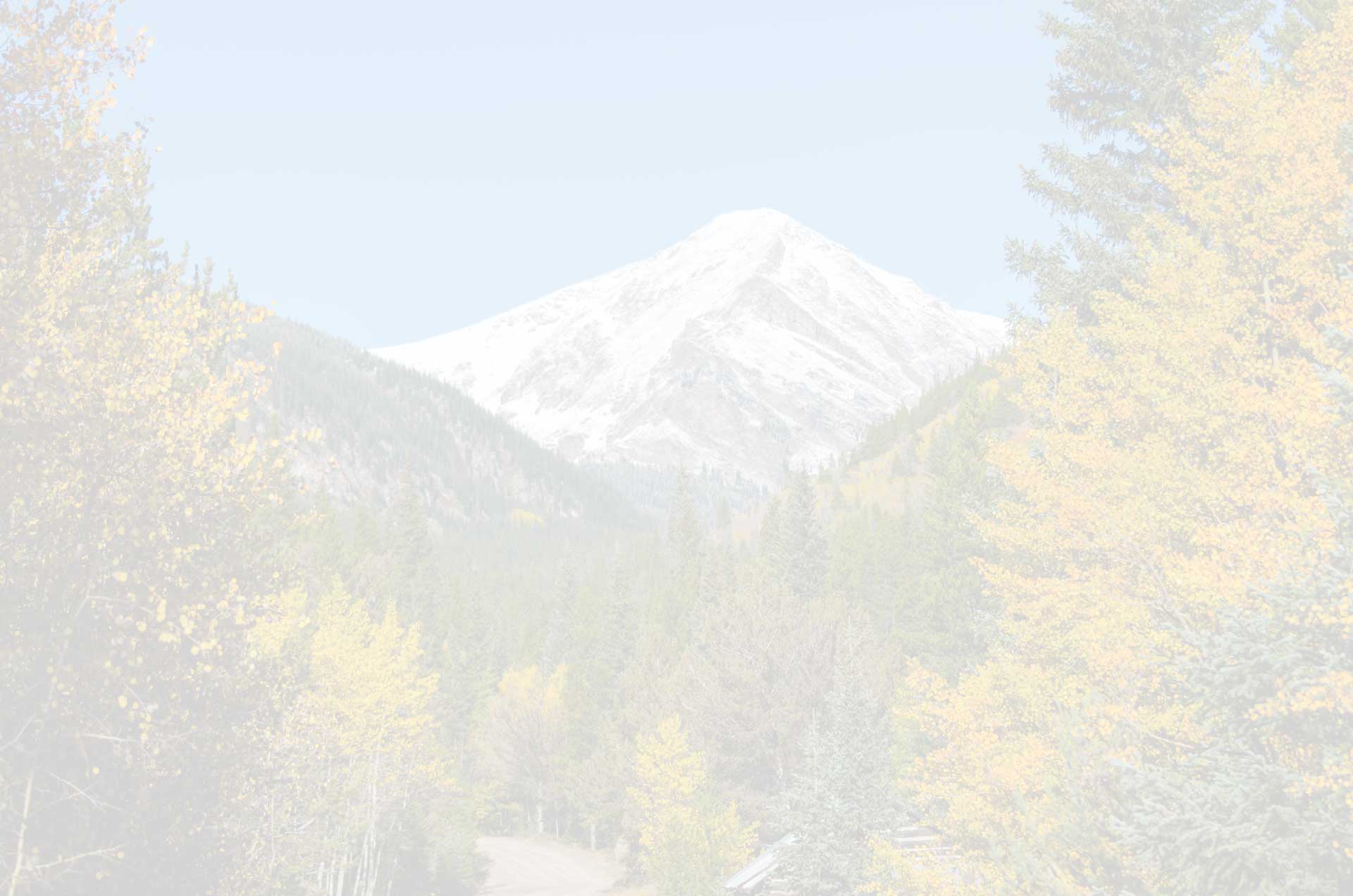The Internet browser fills my head with worrisome headlines. They did this! They are doing that! They, they, they. Soon, I forget to look for what He is doing.
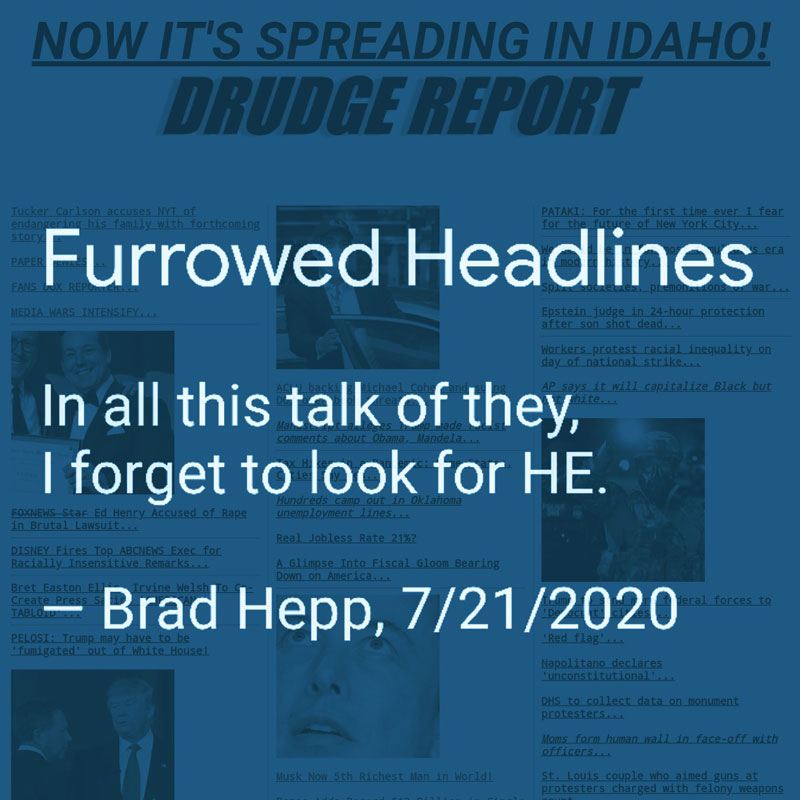
a digital commonplace book
The Internet browser fills my head with worrisome headlines. They did this! They are doing that! They, they, they. Soon, I forget to look for what He is doing.

Surely I’m not alone in catching a whiff of arrogance in the way I sometimes think of those who went before. This came to mind just now as I read Hebrews. God is merciful, not least in revealing the many reasons our elder Brother had to suffer in our place.
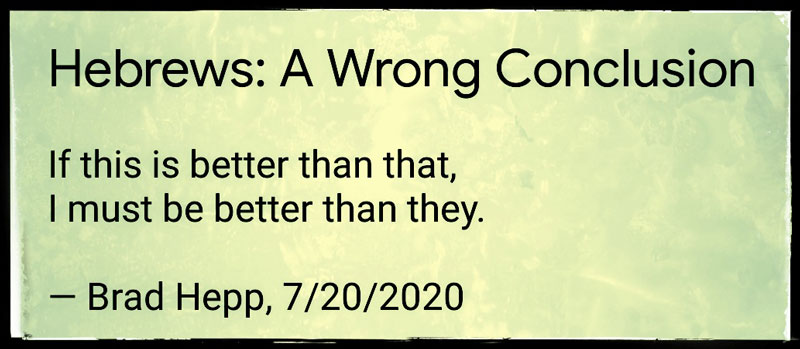
Gratefully, I cry with Browning:
My times be in Thy hand!
Perfect the cup as planned!
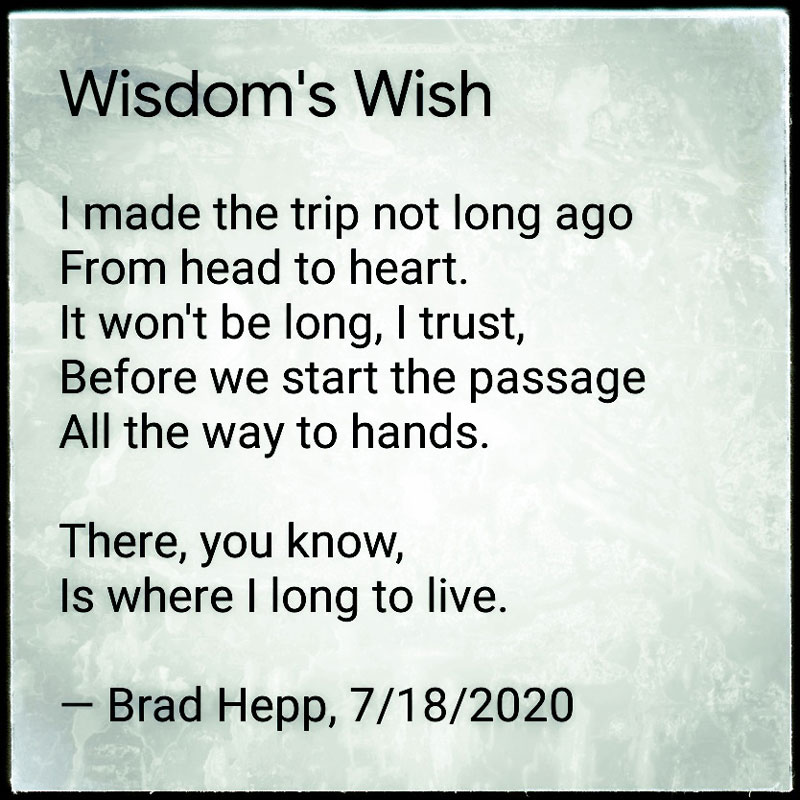
I took a half-mile detour to capture this image on yesterday’s long hike, knowing that a poem was brewing. Storms should never be wasted.
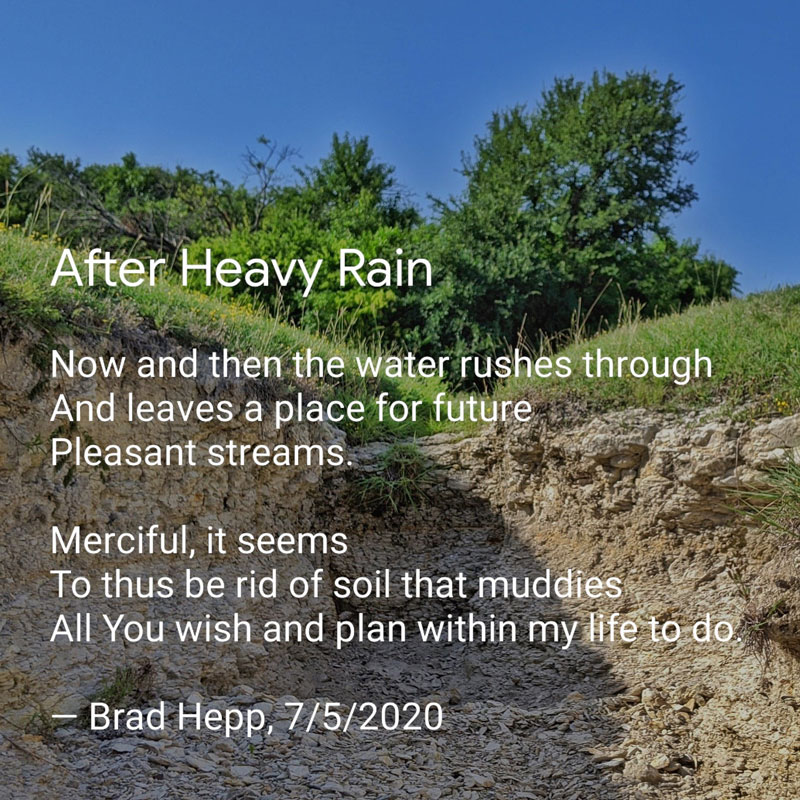
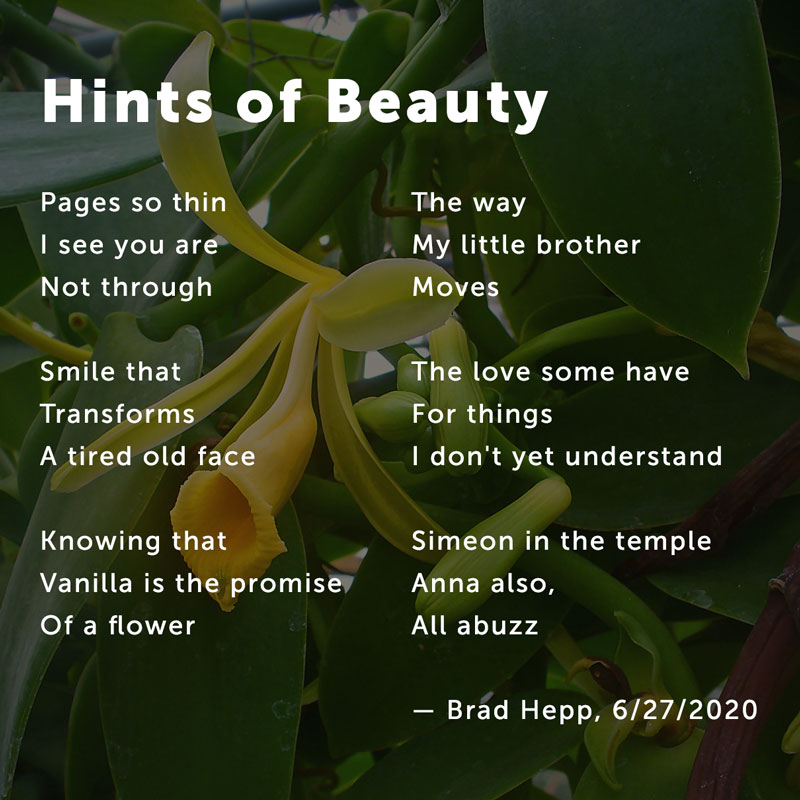
At Christmas, we often hear a child recite the first 20 verses of Luke, chapter 2. That’s beautiful. But it’s the section immediately following that affects me most deeply. When the child Jesus is presented at the temple, Simeon and Anna recognize that they are witnessing something that will change the course of history. They have both waited a lifetime for the “consolation of Israel,” the “redemption of Jerusalem.” And here He is!
This is the least emotionally honest of the stanzas. On those rare occasions when I pick up a printed copy of the Bible to read (my go-to is digital text), I can see through the thin pages to printing on the other side. I am not actually moved by BEAUTY when I see that. Rather, what that points to in this stanza is thematic. What all the other stanzas have in common is the anticipation of beauty replacing ugliness. MacDonald said it well: “The end of the Maker’s dream is not this.” I think that anticipation of beauty is what affects me.
One day, my son and I were waiting at Sonic for the waitress to bring our order out to the car. As we waited, Jonathan commented, “She doesn’t seem very happy.” I responded, “When she comes out, give her a big smile, and watch what happens.”
She came out, holding our tray of burgers and fries. Jonathan flashed a big smile at her, and her tired old face twisted into a responding smile. After we rolled up the window, I asked Jonathan if he had seen the transformation. He had!
I am looking forward to the smile of God, in the restoration of all things (see “Violets”).
Last year, I had spent months photographing flowers on my walks. In Autumn, the flowers were spent, and I wondered what was left to photograph. Then I started looking closely at what had become of the flowers. Seeds, of course. And some of the seeds were also beautiful and fascinating. But what really grabbed me was the realization that seeds are not the end of beauty, but its beginning (see “Dawn of Eternity”).
I love to watch young children moving to music. There is one video in particular that comes to mind. I believe it may be a young Malawi boy moving subtly to music. His smile and movement are enchanting. So why “my little brother”? I’m the youngest of my family. I don’t literally have a little brother. Rather, I look forward to a day when barriers are removed and we can fully enjoy the brotherhood of man — with all its cultural diversity and beauty.
I have had several exchanges about language with my Ethiopian friend Yohannes. When he points to beautiful speech and ideas expressed in Amharic — a language I do not know — I tell him I’m jealous. His response: “That’s beautiful my friend. It speaks of a lot of good things. The wonderful thing is that one day we shall all understand!”
I wrote above that the accounts of Simeon and Anna in Luke 2 affect me deeply. Here’s how deeply…. Once, I was walking around the lake listening to an audio version of the Bible. When I got to the account of Simeon and Anna, tears started streaming down my face. It was a good thing nobody else was out walking that day. Why was I so moved?
Simeon and Anna were both very old. They would soon die. But this child filled them with hope. Perhaps it was “merely” hope for their people. But you and I know the rest of the story. Thirty-something years hence, Jesus would die a death that will forever put an end to death and ugliness. His Resurrection from the grave demonstrated God’s power and pleasure in restoration. Like all who believe, Simeon and Anna will once again embrace their beautiful Creator.
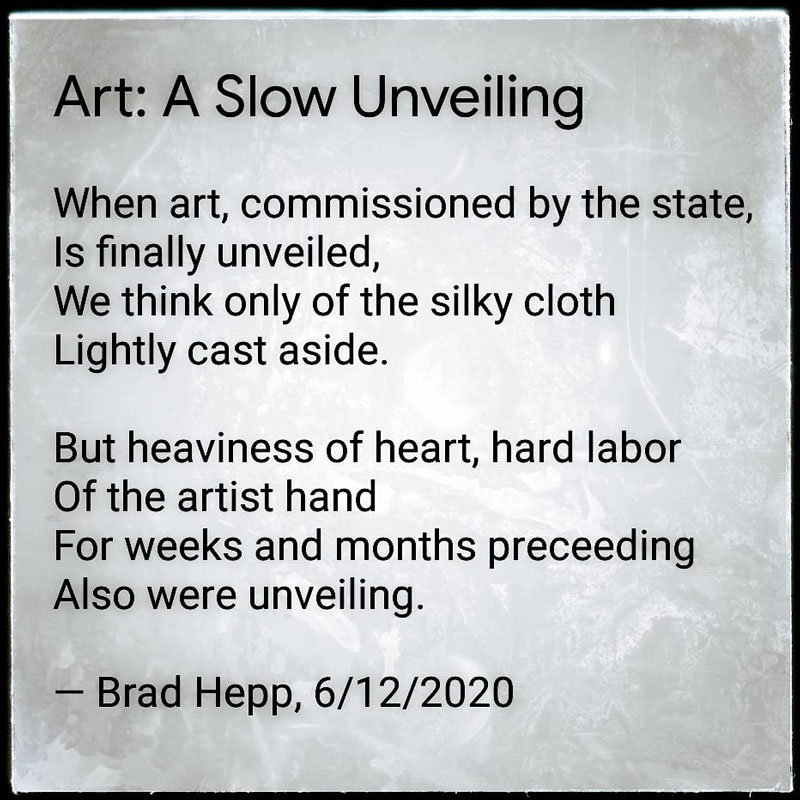
This is a companion piece to Music: Beauty’s Channeling
This is a second attempt to understand beauty as preceeding its so-called production. Although it may seem that I am empasizing the heavy task of the artist, the real point is that the artist is unveiling beauty from the time he or she begins the project. As one who believes that creation is full of beauty put there by God, I am trying to appreciate his role… without diminishing the role of the artist.
Michelangelo said something similar long ago:
The sculpture is already complete within the marble block, before I start my work. It is already there, I just have to chisel away the superfluous material.
Michelangelo Buonarroti
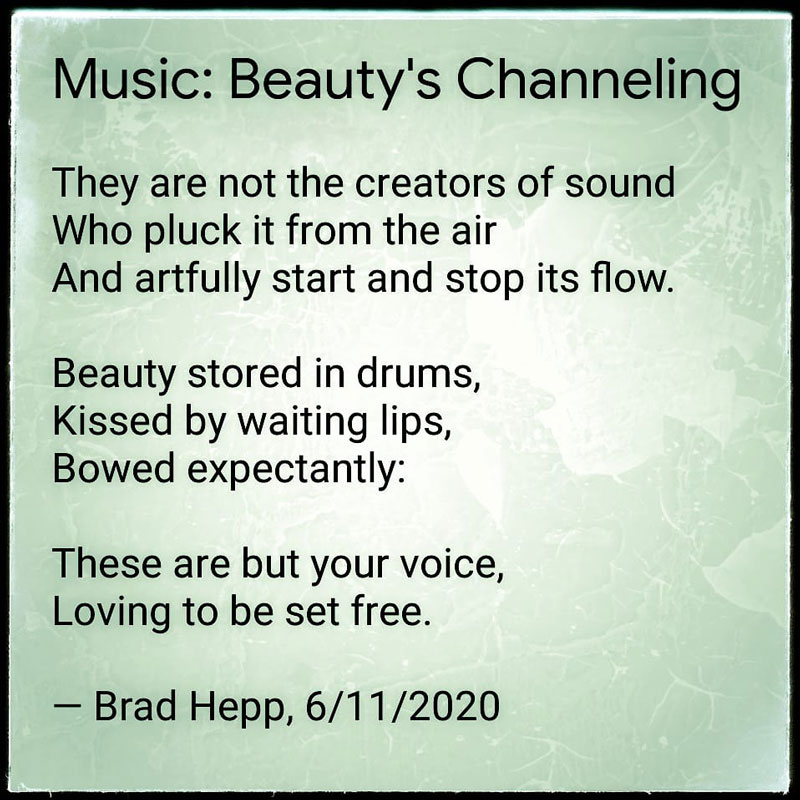
Every day, when I lie down for a nap, I listen to beautiful music and try always to think of where beauty was born. This may sound silly to some, but I’m trying to put myself in a place where I can better appreciate beauty. So — brace yourself — I picture myself sitting on the edge of a cliff, looking out over a beautiful creation. The creator himself is sitting next to me. I am listening with him. That’s how I fall asleep.
After several weeks of doing what I just described, I was sitting one evening listening to beautiful music. Suddenly, I had a different perspective: the music struck me as a capturing of the beauties of sound, not their mere production. So I thought of an orchestra:
The strings “pluck it from the air.”
Percussion releases it from drums in all its vigorous exclamations.
Brass and woodwinds kiss it with their lips.
Strings express the tension of pent up beauty with their bows.
And then, the point: God can’t help but express (voice) beauty, and loves to share it with us, his creatures.
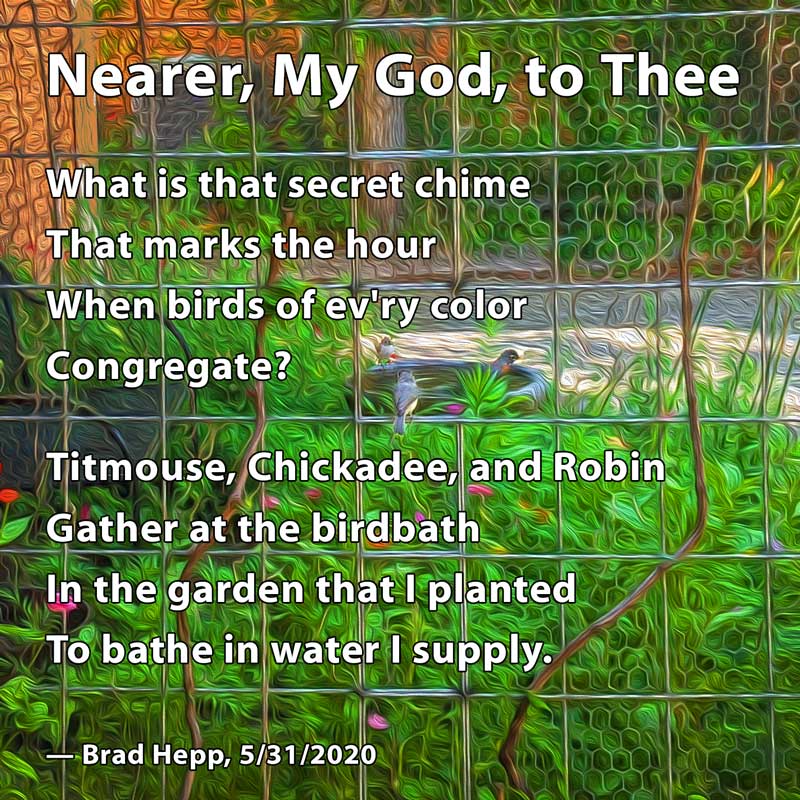
I dedicated this little poem to my friends of color, by whose grace, wisdom, and other beauties I hope to better appreciate our Heavenly Father. It’s a slow process. Foolishness is bound up in this heart of mine.
The background image is a stylized photo that I took from my office window. There are times of day when several birds come to my garden. I haven’t figured out why the various species pick the same time, but they do. Almost always, the titmouse and chickadee couples come at the same time. And when they come, they are often joined by a cardinal couple. Is there a certain light or temperature that is just right? I don’t know. Thus the question: “What is that secret chime?”
I titled this “Nearer, My God, to Thee” because the pleasure that I take in the variety of birds who congregate in my little garden must be akin to the pleasure God takes when people of every nation peacefully enjoy the world he created.
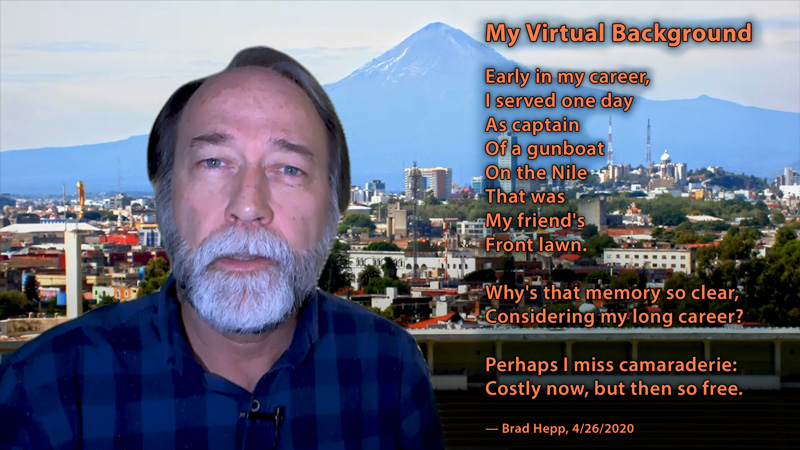
DREAMS OF ANOTHER LAND
That life should get progressively better, and satisfactory here and now is illusory. We are exiles, who learn our condition slowly, if at all.
This week, I got to do the scripture reading for our church’s virtual worship service. The passage was 1 Peter 1:1-2. That’s a short passage, easy to read. But when my pastor indicated that he liked the idea of a personal introduction, I had an extremely hard time recording it. Thinking about what it means to be an exile, and the hope we have — given God’s kind plans for us — I was overwhelmed with a mixture of sadness, hope, and thankfulness. I’d get to “according to the foreknowledge of God the Father” and stop the recording, because I just couldn’t go on. By the way, the background image above is a frame from the reading when I finally got hold of my emotions.
Thinking of my birth city in another land brought back memories last night, and I had to work them out in a poem this morning.
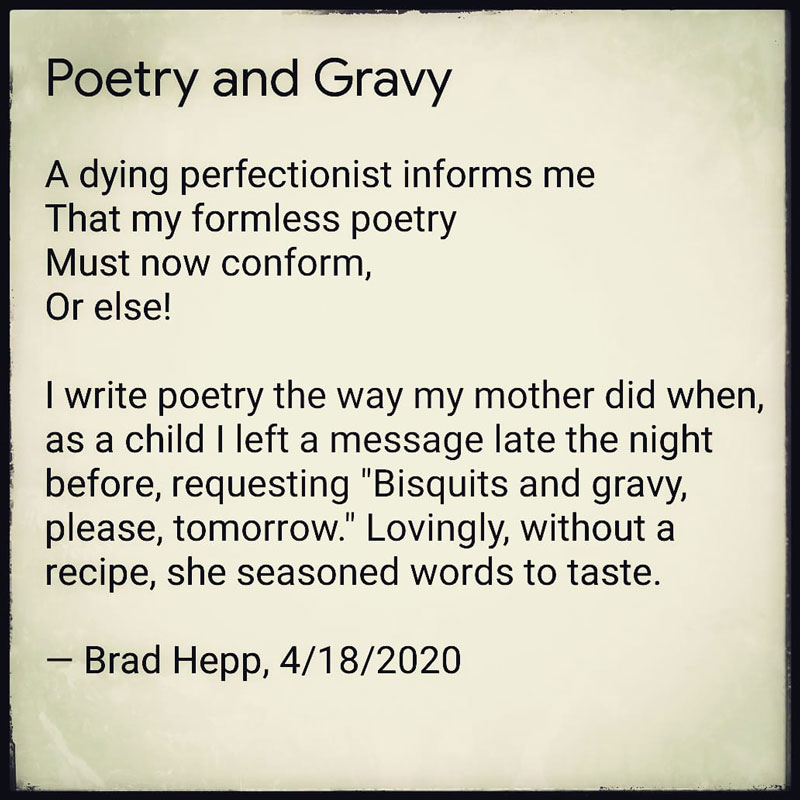
I’m not sure if Mom ever actually wrote poetry. She definitely was a terrific story teller, which hundreds of now grown-up kids can confirm. And she wrote tight accounts of her childhood, and of God’s remarkable provision for our family over several generations. She was skilled at oil painting, and flowers were always happy to grow for her.
The reference to a “dying perfectionist” is self-referential. I usually refer to myself as a “recovering perfectionist.” It’s a gift and curse I inherited more from Dad. He and I enjoyed discussing Robert Browning’s difficult “Rabbi Ben Ezra.” We never discussed the kind of loose-form poetry that I write. Would he approve? I’m not sure….
Back to Mom. She was an artist. Truly. I grew up understanding that she had a gift I will never possess (although she, like other artists would insist that I could possess it, if only I tried).
My work on poetry has been an attempt to reach honestly into my heart, and then to express clearly what ugliness and beauty that I find. Bacon grease, milk, flour, salt and pepper…. Stir, but not too much. The gravy emerges, slightly different each time, but always a perfect complement to homemade bisquits.
Speaking of which…. Where are the bisquits?
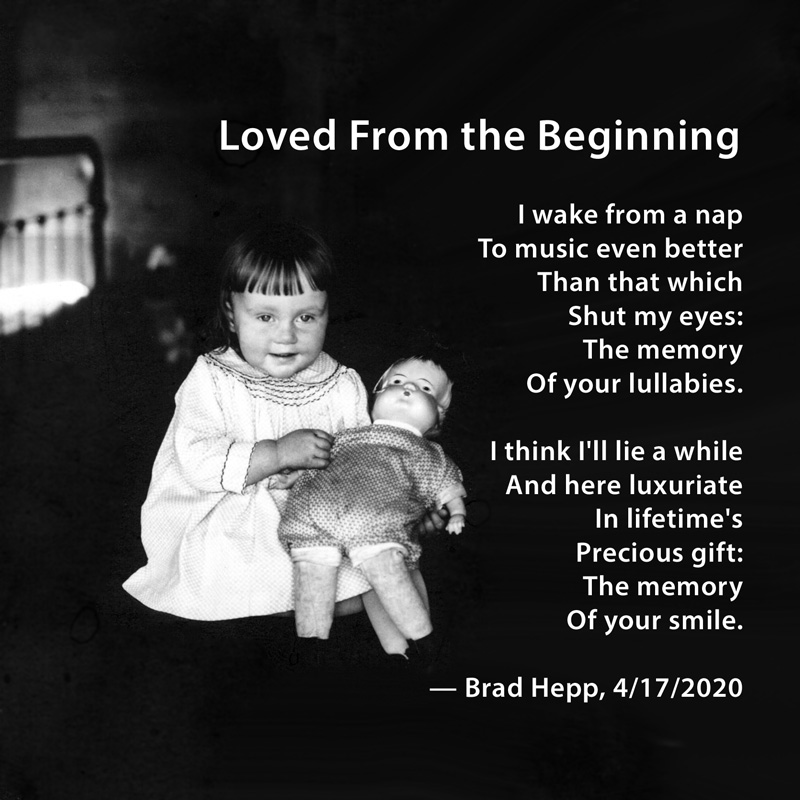
You should probably never ask me to TALK about this little poem… too emotional! The background photo is of my mother when she was a little girl. The photo was taken in the early 1930s. Mom was taken in 2006. It occasionally becomes obvious that I’m not through grieving.
The setting when I thought of the words really was waking up from an afternoon nap. As is often the case, I was wearing ear buds, and had been drowning out the noises in the house by listening to one of my favorite Pandora stations. As I awoke, I was keenly aware of how beautiful the music was… something from Pat Metheny.
I listened to another piece, and then another. Each was as beautiful as the last.
My mind went back through the years to the experience of taking naps as a child, to the awareness of family in other rooms, their voices becoming distant and indistinct as I fell asleep. I cannot actually remember anything before that. However…
Traveling back in time, I arrived at the conviction that my exquisite experience of beauty — here in music — has always been rooted in the love of my mother. She herself was beautiful. She loved me, and she loved beauty. But she also pointed me farther back, to the Author of beauty.
Time did not begin with my birth. When a Christian like myself refers to “love from the beginning,” he or she inevitably alludes to our belief that God has loved his children and had kind purposes for them “from the beginning.” When the Apostle Paul writes about this, he gets into one of the long run-on sentences (in the Greek) that signal his excitement:
Blessed be the God and Father of our Lord Jesus Christ, who has blessed us in Christ with every spiritual blessing in the heavenly places, even as he chose us in him before the foundation of the world, that we should be holy and blameless before him. In love he predestined us for adoption to himself as sons through Jesus Christ, according to the purpose of his will, to the praise of his glorious grace, with which he has blessed us in the Beloved. In him we have redemption through his blood, the forgiveness of our trespasses, according to the riches of his grace, which he lavished upon us, in all wisdom and insight making known to us the mystery of his will, according to his purpose, which he set forth in Christ as a plan for the fullness of time, to unite all things in him, things in heaven and things on earth.
Ephesians 1:3-10 (ESV)
I’m convinced that knowing the Creator, and being confident that He loves me, enables me to better appreciate the beauty of His creation.
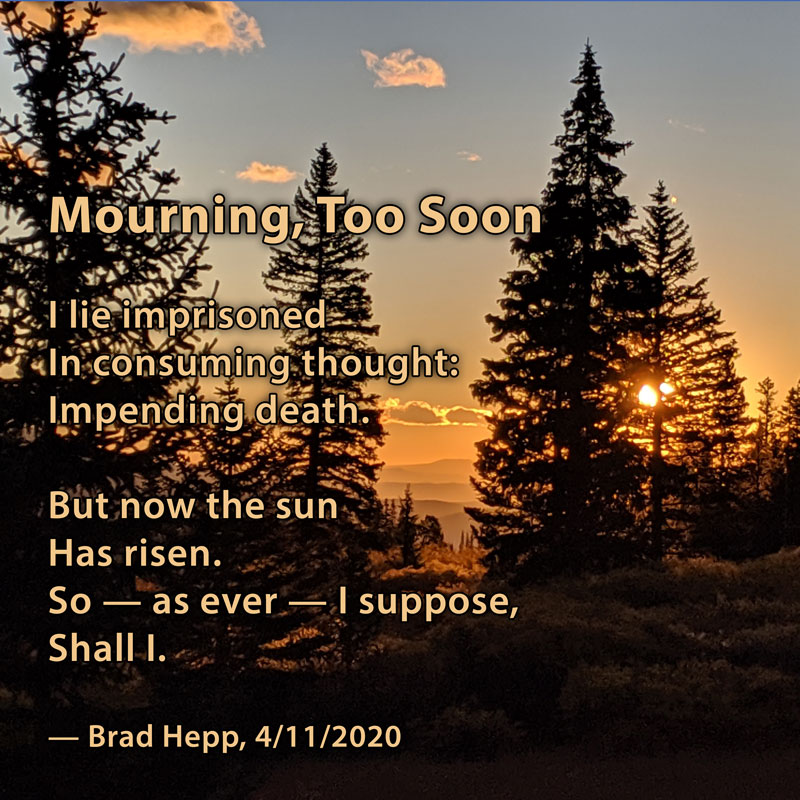
This is not an Easter poem. Or is it?
I jotted this down yesterday morning after a sleepless night, one where an admittedly minor ailment was reminding me of what took the lives of my parents. I’d have posted it yesterday, but ran out of time. Now, as I post this, it is Easter.
If you see ambivalence, mixed with annoyance, mixed with underlying hope, you see well. Hopefully, my reading of the poem (above) will reveal the negative side of my feelings.
The background photo is one I took up in the mountains last year on a similar morning, after a similar night.
Here is an exchange I had with a concerned friend, when he asked about the ailment. After describing the ailment, I wrote:
So, the poem was written out of fear and mild exhaustion, but with the realization that I was not acting in the full hope that often moves me. It’s full of double meaning.
Darol responded:
Yes, the middle of the night amplifies our fears and disappointments. I tell myself that the daylight will scatter them, and that they will end forever in that eternal morning.
Good, wise friends. They’re the best!
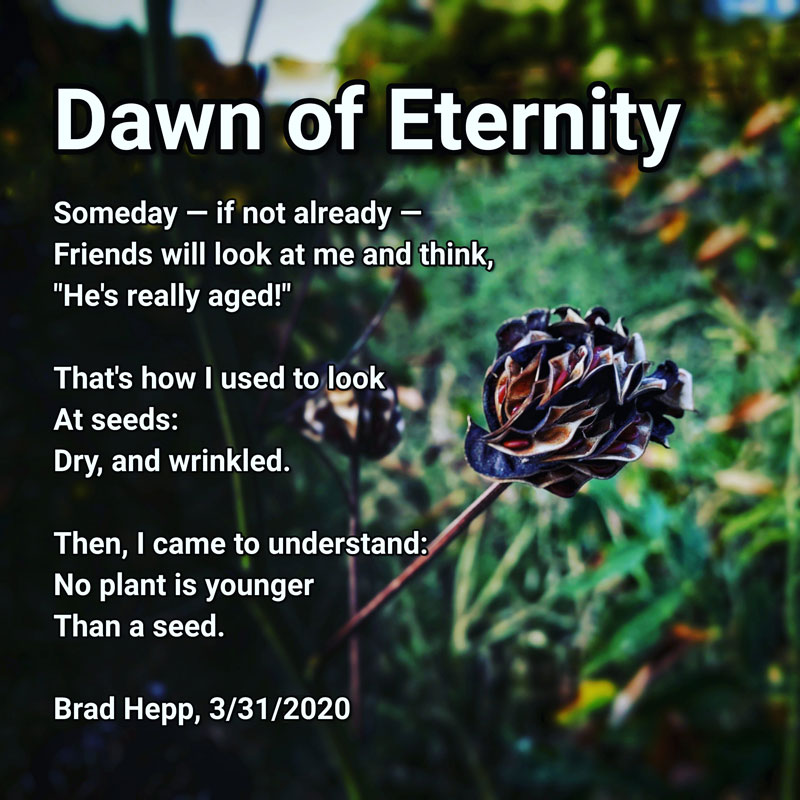
Last Fall was a revelation. I thought, like a friend had said, that I had “…about covered it all.” I had been taking photographs of wild flowers around the lake for several months. Now, everything was beginning to die, to dry up and shrivel. What was left to photograph? Then I looked deeper. I decided to focus on what was becoming of the flowers I had photographed. That’s when I came to the realization voiced in the poem above.
Yesterday, I observed a photo someone recently posted for their parent, and a subsequent video. The aging that happened between the photo and the video was marked. Then I looked in the mirror, and the opening lines of this poem popped into my mind!
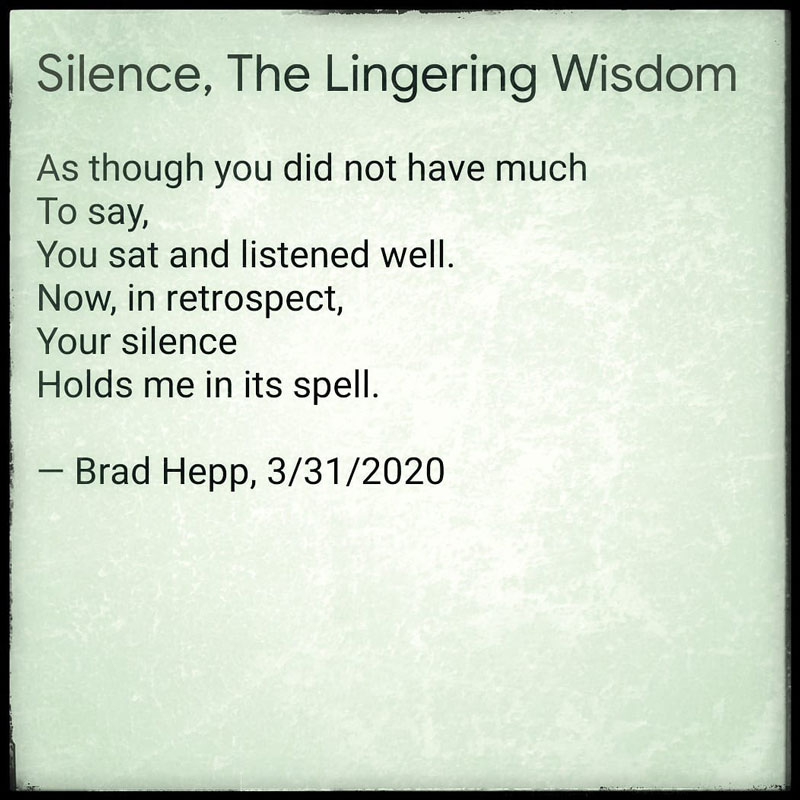
This was prompted by a handful of memorable experiences, mainly when I was blabbering, and my listener was not.
[March 31, 2021 Update]
Recently, I have had many occasions to revisit this pleasant reflection. I have several friends who are considerably smarter and wiser than me. That’s not surprising. What IS surprising — and endearing — is the courtesy these friends extend me in conversation. When we’re talking, they don’t interrupt me, or they quickly apologize if they do. They sit there and LISTEN as I “think out loud” and then they have the patience to let time heal the wounds in my thinking. Such people, I can’t help but love and admire. God make me more like them!
[September 16, 2023 Update]
I often come away from conversations with my best friends amazed at their courtesy. They’re my best friends largely because they are smarter and wiser than me. I VALUE what they have to say. But because they are courteous, they generally listen without interrupting. These friends are the very people I wish would interrupt, but they don’t.
Yesterday, I had an encounter of a very different sort. I introduced myself to a patron at the library. We began what I thought was going to be chit-chat. But it turned into very little chit and a whole lotta chat. She had much to say. Every time I opened my mouth to comment, she’d say “Hold on!” and keep holding forth. After two or three such “zip-its” I literally put my finger on my lips so I wouldn’t be tempted to turn her diatribe into a conversation.
Since I didn’t really have anything I felt compelled to say, the whole thing amused me. I served her by listening… on her terms for sure.
Incidentally, the poem in this post was inspired by a conversation with my friend Sten-Erik Armitage. He was my pastor at the time. He’s still a friend to whom I sometimes send raw poems, when I fear posting them to the general public. Such a friend is priceless!
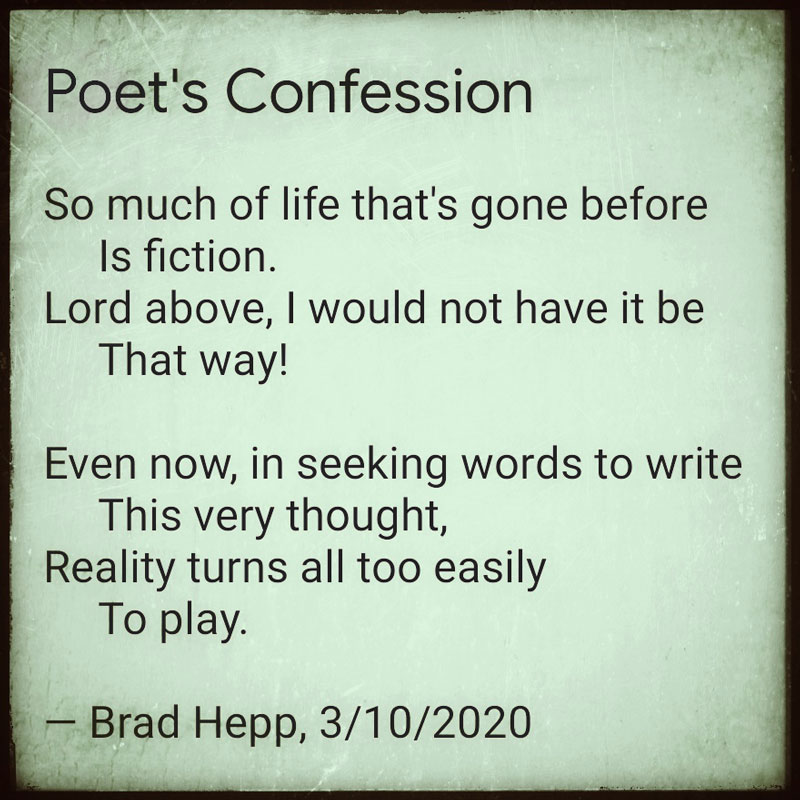
I recently began listening to the Audible recording of Augustine’s “Confessions.” Last night, before falling to sleep, I was watching a lecture by James K.A. Smith on “Augustine Our Contemporary.” Just as I got too sleepy to watch anymore, he was talking about authenticity, and how that resonates with modern thinkers.
So, when I woke up this morning, my mind went immediately into writing this poetic response. The subject occupies a large part of my thinking. What is real in my everyday behavior, and what is fakery? By God’s grace, I believe there HAS been progress in becoming sincere, authentic, genuine. But the cost of that transformation is a clearer view of what remains untransformed.
Writing poetry is a strange activity for me. My recall of language is spotty. In fact, it would be rare for me to be able to quote even one of my own poems. I look back on them and wonder, “How did that come out of my feeble mind? I can’t put the words together now; how did I do it then?” Words are often just beyond reach. Simple words. It’s a little painful. Just now, I needed to look up the video I reference above, and for a few seconds, I could not think of the word “YouTube.” If this had not been a weakness of mine since youth, I’d be worried.
So, you may be able to understand why writing poetry is a special pleasure for me. It is a small triumph, a pleasure to balance the pain of a language deficit. It is very much like the pleasure I experience in reading Scripture for a worship service, or even in recording my poems. There was a period in my life (Junior High through High School) when I had a speech impediment that interfered with smooth reading and speech. To be able to pull off a reading or recitation now without major hickups is a small triumph. It’s pleasure to balance pain.
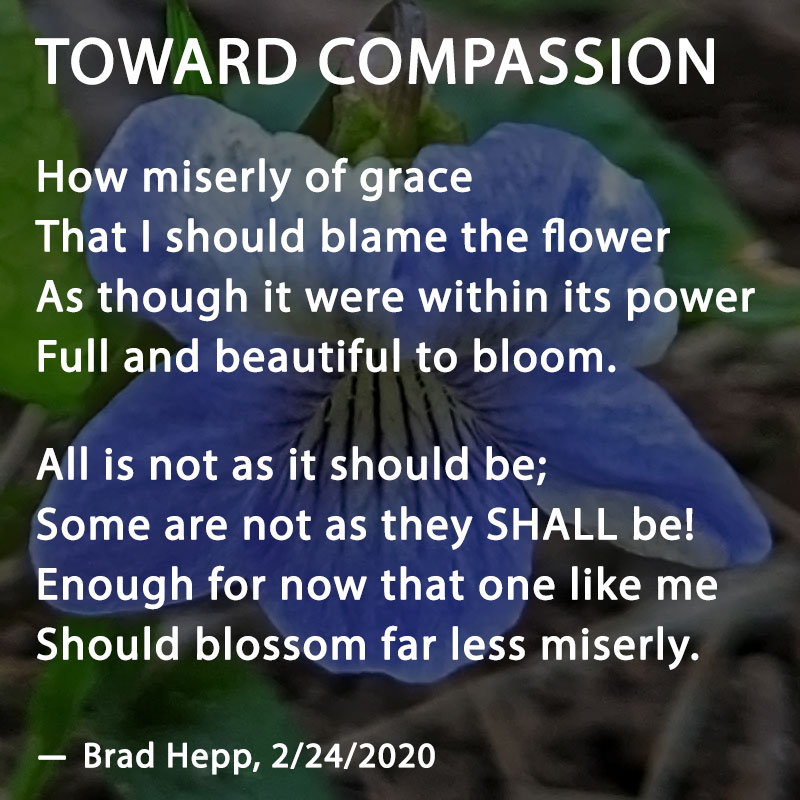
This poem is about judging others harshly, and the need to deal with my lack of grace.
“Miserly of grace”
I may be leaning on questionable grammar here. The point is that I am being miserly in my exercise of grace.
“That I should blame the flower”
This poem is about my attitude toward people, not toward flowers. But I draw on the analogy of judging flowers harshly. Ridiculous, huh? If I can see the folly of that, maybe I can extend the lesson to my harsh judgment of people.
A NOTE FOR THE CONTRARIAN:
You may ask, “Don’t people have more control over their own behavior than flowers do over how well they bloom?” Yes and no. Since we have a will, we can choose to make progress in the refinement of our behavior. But progress can be slow. We all have backgrounds that predispose us to failure in particular areas. For example, a person who was abused as a child may WANT to be more trusting of their friends and partners, but the channels of mistrust run deep. We ALL have deep-rooted emotional baggage. Some of it results in easily-recognized behavioral problems. Some of it results in masked arrogance (or is that the mask of arrogance?).
“Some are not as they SHALL be”
This line moves from the universal problem of a fallen creation (flowers and people) to a smaller set of people. Who are they? It refers to those who trust in Jesus Christ. They expect someday to be resurrected with a glorified body — and mind! — similar to what He has. Now, they are frustrated in their attempts to be better people. Then, their limitations will be lifted.
“Enough for now that one like me”
Here, I look in the mirror. If I insist on judging and demanding change, I should demand it of myself.
“Should blossom far less miserly”
Back to the flower metaphor…. If I’m going to judge how flowers — and people — bloom, I should make sure that I am blooming well, that I am being generous with grace.
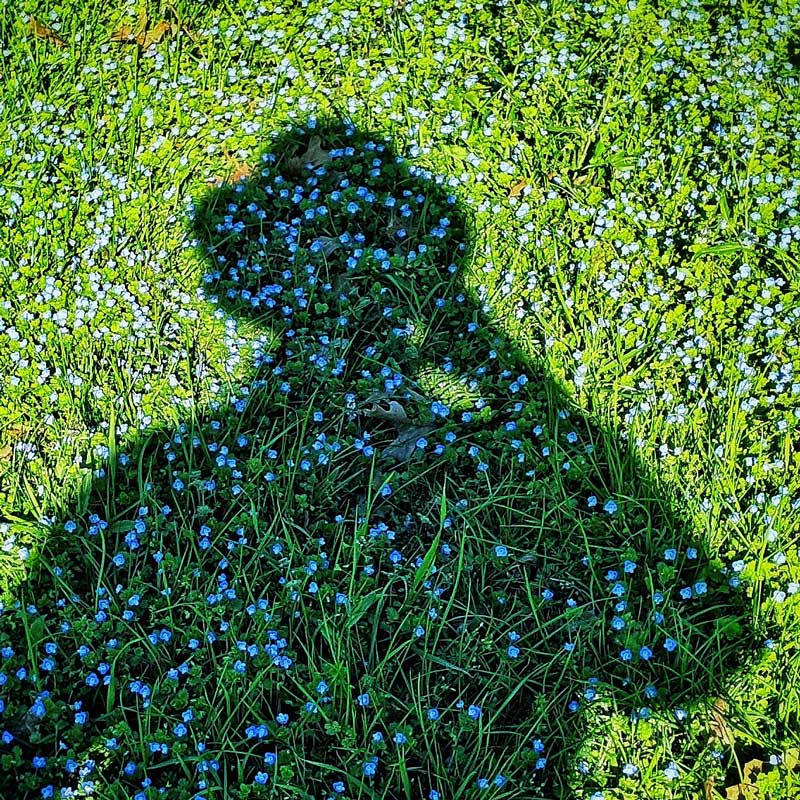
UNJAUNDICE VISION
Only in the shadow
Was the yellow light
Sufficiently subdued
For us to welcome
Beauty unforeseen.
— Brad Hepp, 2/22/2020
There, now I have tied this to the conversation I was having with a friend when I took the photo. We were pondering how weakness and inadequacy may actually be celebrated as part of the suffering that precedes restoration and exaltation in the Divine economy. See James 1:9-18
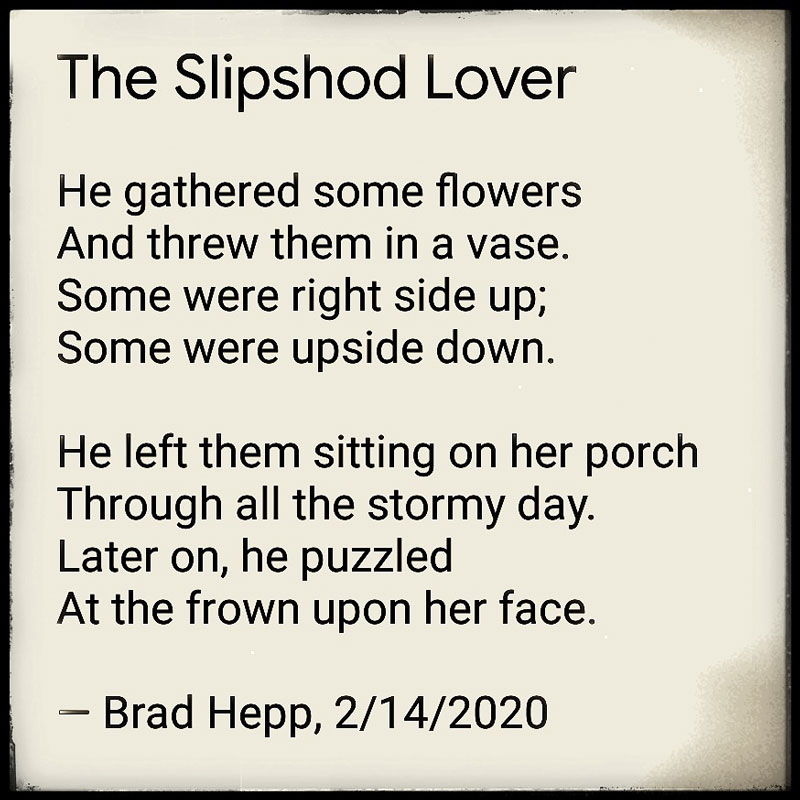
Dear God, let me not be this guy!
Actually, in the careless way I built this poem, I WAS THIS GUY. I can do better with my poetry — and occasionally do. The almost comical reality in my life is that practically every time I point to “someone else’s” failings, it is my own failing that quickly comes into view. I have seen this so often when criticizing grammar! Point out someone else’s poorly-constructed sentence, and I’m sure to blunder within two or three of my own sentences.
I’ll never forget the illustration my friend Jim Adams gave us for the blemished sacrifices passage in Malachi. He brought the class a big bouquet of wilted flowers. That was over thirty years ago. That’s how good a teacher he is!
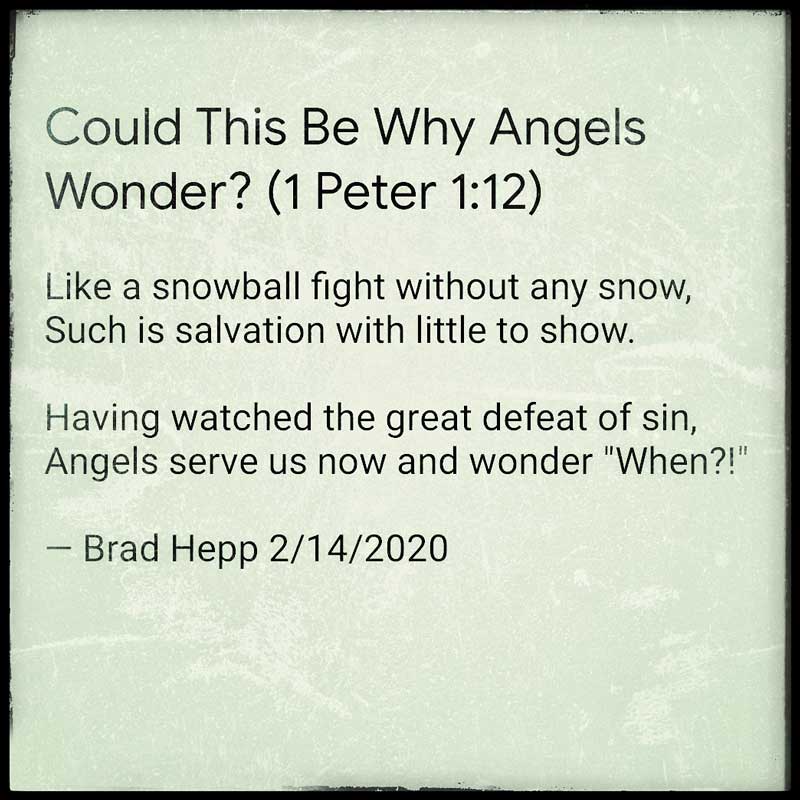
I didn’t get much sleep last night, pondering thoughts that wouldn’t pass muster in Angelology 101: Imagine for a moment the possibility that angels don’t possess our (humans’) imagination…. How odd we might seem to them. We philosophize, rhapsodize, and consistently compromise, imagining all along that thinking counts as doing, believing as obeying.
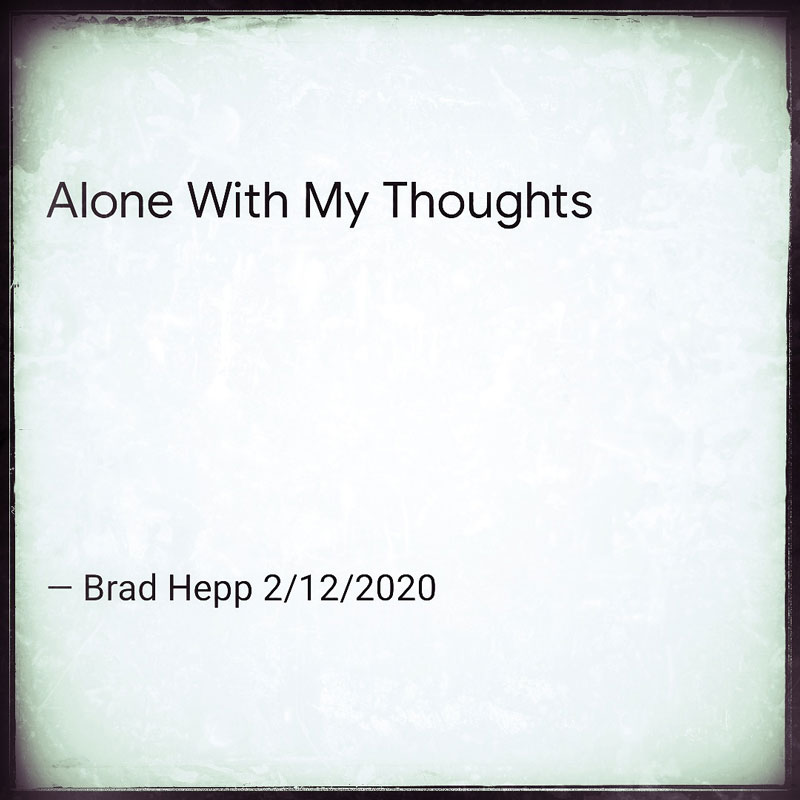
I guess every poet comes up with this one eventually.
This “poem” is not silly. In fact, I have never been more serious or intentional in anything I have written. It is not that I have no thoughts. Nor is it that I don’t want to share my thoughts with others. It is that there is no such thing as thoughts I have while “alone.” It may drive me to insanity, but I am determined to become consistent in my belief in an all-knowing and very present God. One of the worst hidden hypocrisies in my life has been holding the belief that I have “the ear” of the most powerful being (God) but not voicing my thoughts about others to Him. How many times I have scrolled through Facebook and thought this or that about my friends and acquaintances without “voicing” those thoughts to the One who can do something about my concerns? Do I see someone who is filling his or her life with hatred? Why would I not voice my concern about that to all-powerful God, the one best able to teach them love? Do I see someone hurting and reaching out to friends for comfort? Why would I not voice my sympathy to the great Comforter? Hypocrisy is usually associated with action. My hypocrisy has consisted of inaction.
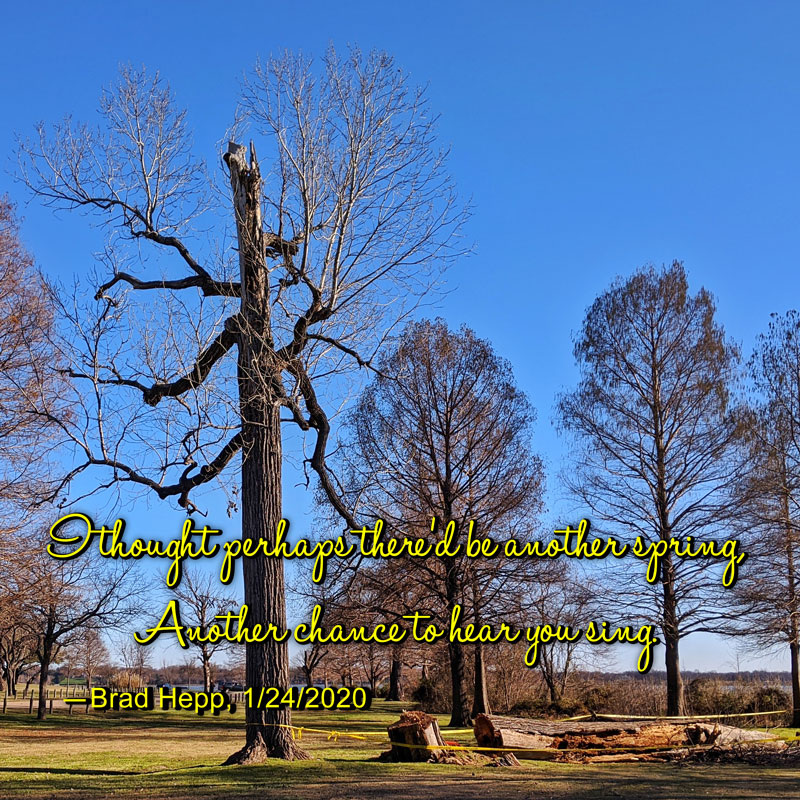
This scene, and the words I attached to it, is extremely moving to me. I guess that by my age, there is a lifetime of grief that will not go away in the short term. As a friend wrote, there are “So many missing springs.” Indeed. I can never see the daffodils, wild violets, and other spring flowers without thinking of my Mom. Ever since 2006, they have bloomed without her.
The scene is what I saw when I crossed the bridge where Rush Creek enters White Rock Lake. A few weeks before, I had taken the following photo, which I then captioned “Grow Old Along With Me” (an allusion to Dad’s favorite poem, Rabbi Ben Ezra by Robert Browning:
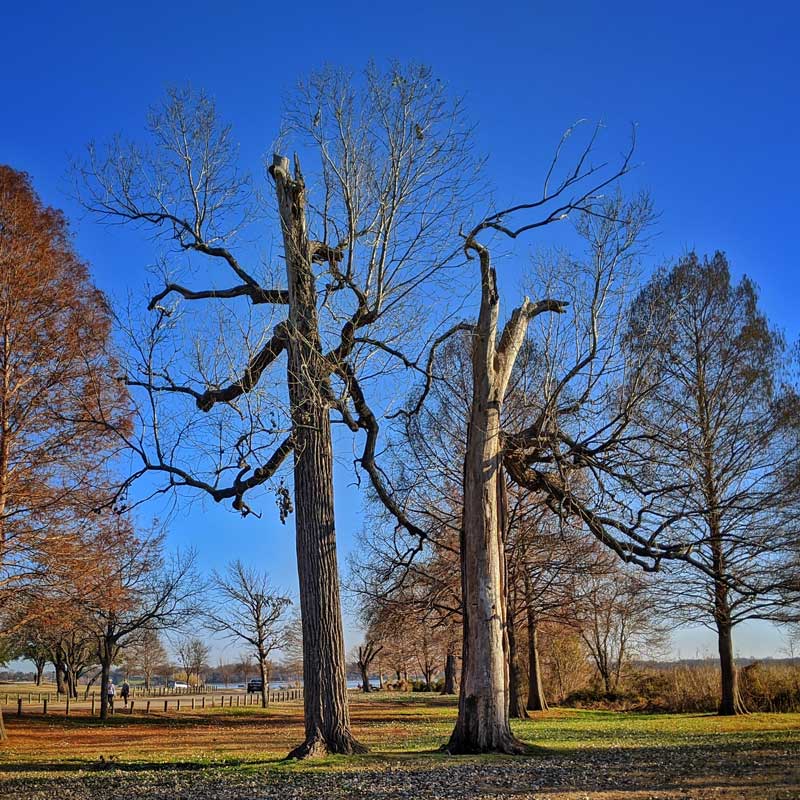
Too often, people are not on this journey at all. Instead, they look only for confirmation that they already arrived.
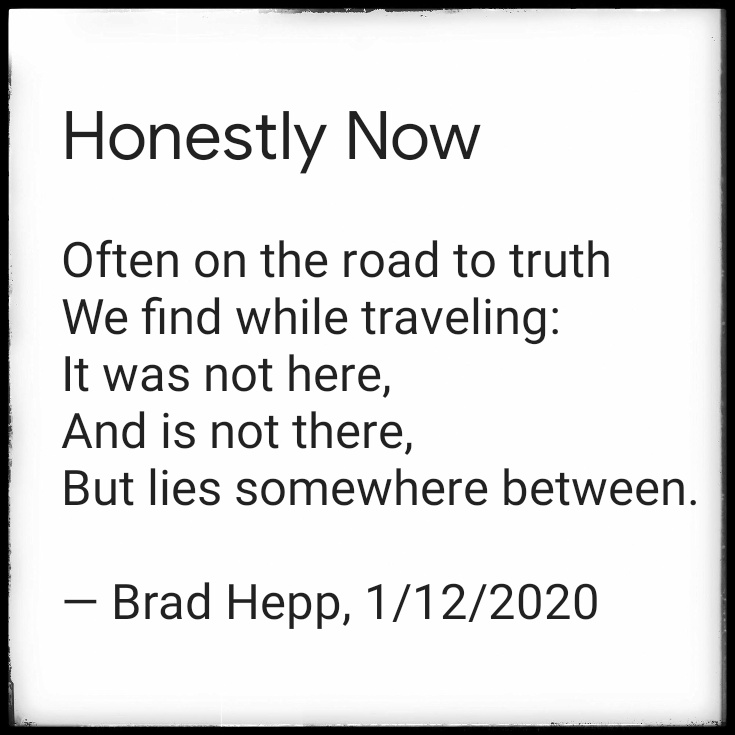
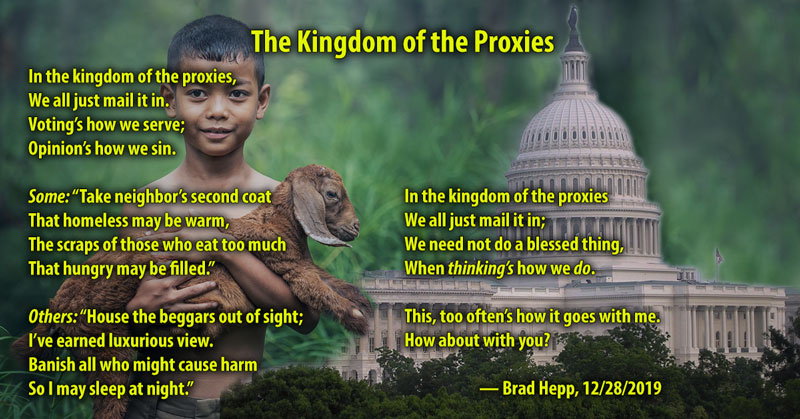
At a recent luncheon at Dallas Seminary, a young lady asked the Australian speaker a profound question, which he didn’t seem to understand: “Does having grown up under monarchy help you better understand these concepts?” I immediately understood her because I think a lot about what is influencing my thinking. The following [above] poem is one attempt to discern how I am affected by having grown up under representative democracy. There have been societies where people didn’t spend a fraction of the time we do THEORIZING about how GOVERNMENT should use our neighbors’ money to effect justice and virtue. Sometimes it seems that’s ALL we do.
We Protestants love the phrase “Kingdom of Priests.” But I fear we may love it for the wrong reason. We love the privileged access we have to God, not the responsibility that entails with regard to God and our fellow man. We are in danger of exchanging “proxies” for “priests.” If you think this is a call to embrace one perishing political system over another, you could not be more wrong. It is precisely the reliance on foolishness of the left and foolishness of the right that I am trying to escape.
This is admittedly an odd poem to write on Christmas morning. Let me justify it. Here are some of God’s gifts that affect me deeply:
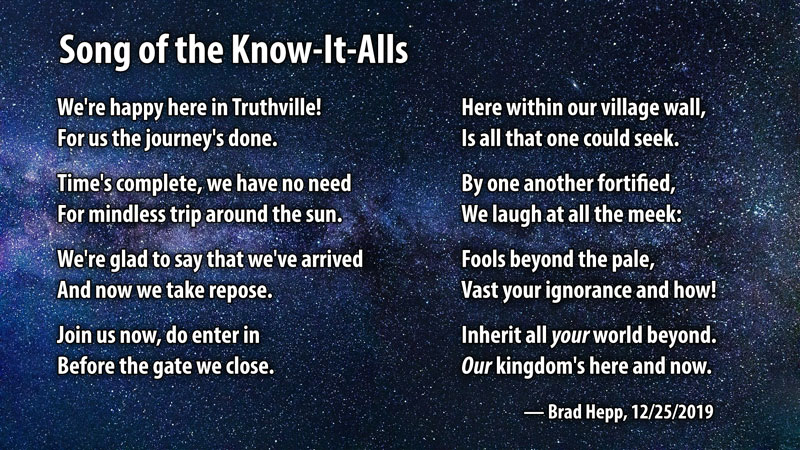
In case you are wondering…. I DO believe there is such a thing as truth. But we currently possess very little of it. I’m thankful that there is all eternity to explore and learn.
Rather I prize the doubt
from Browning’s “Rabbi Ben Ezra”
Low kinds exist without,
Finished and finite clods, untroubled by a spark.
https://www.poetryfoundation.org/poems/43775/rabbi-ben-ezra
The tone is sarcastic. In my favorite part, the last two stanzas, the “Know-It-Alls” are speaking to those who think there is a world yet to explore. They refer to them as fools, whose ignorance is vast. What satisfying irony that the very thing they criticize is the seed of a superior inheritance.
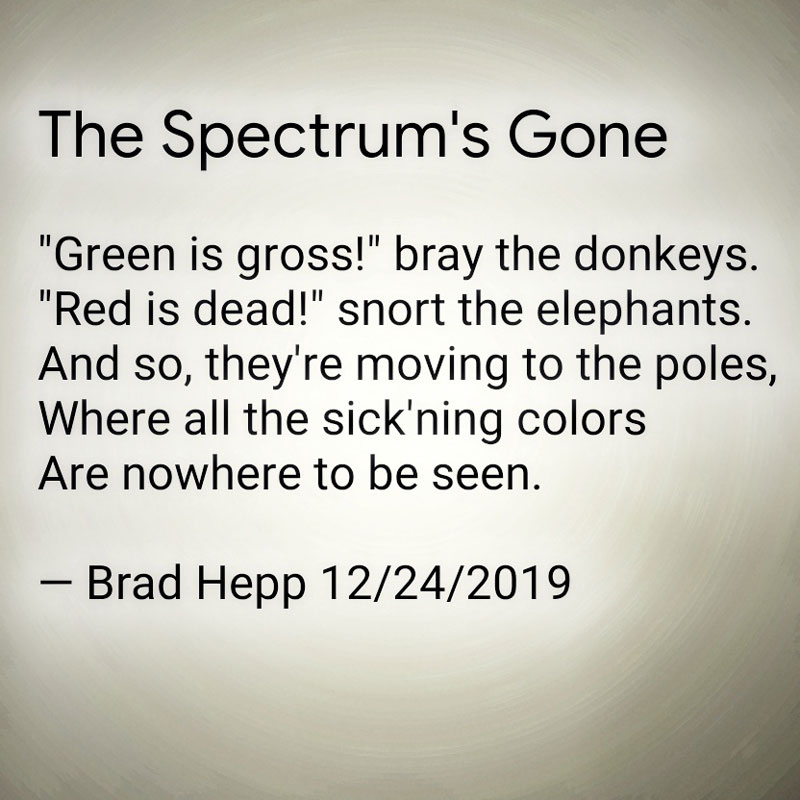
This is a response to polarization, and the sense that an honest, thinking person has nowhere to belong in the United States political landscape.
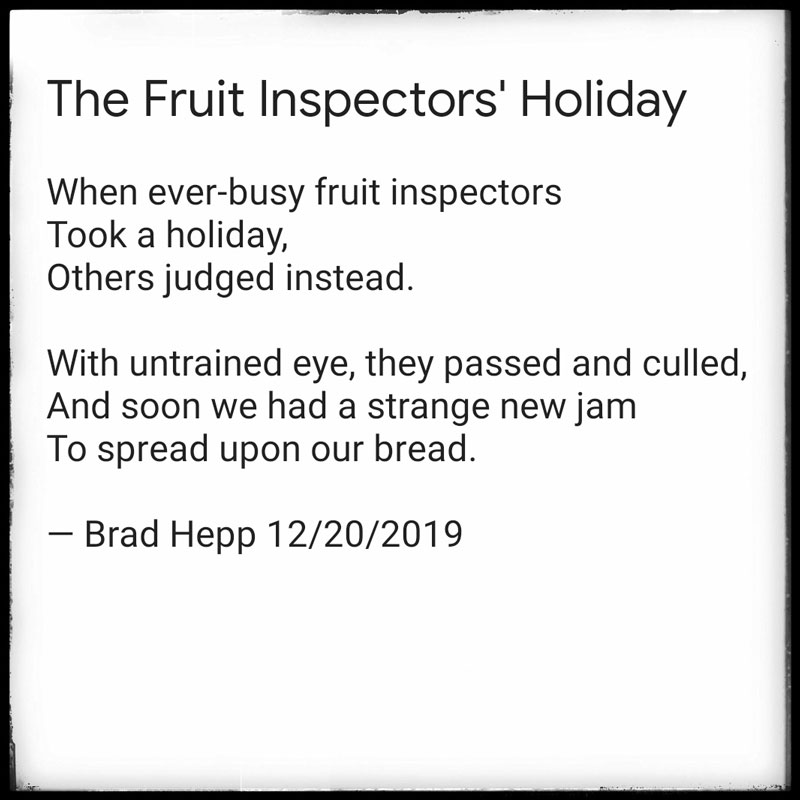
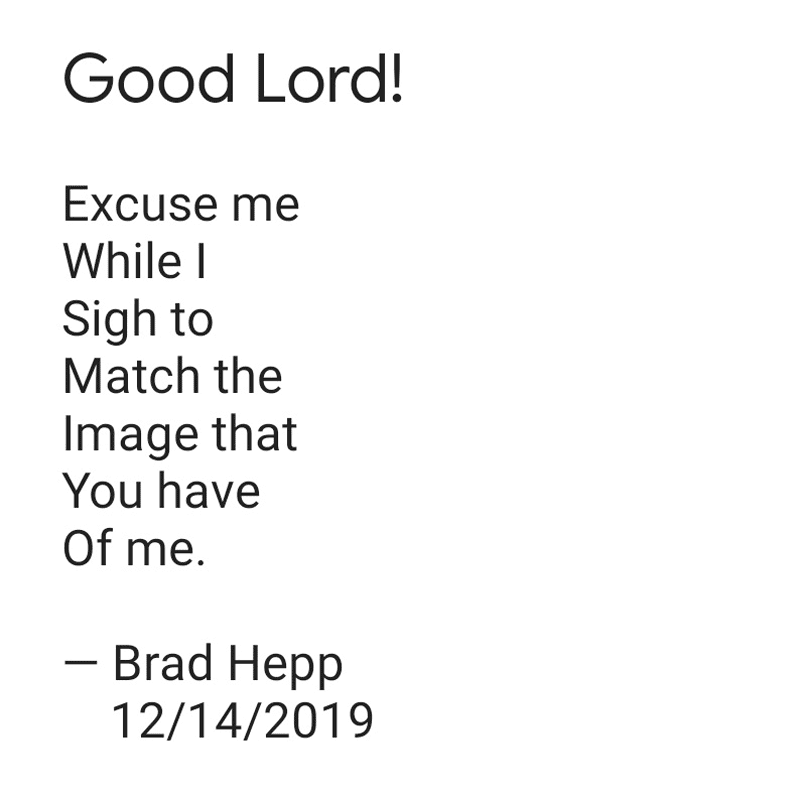
Distillation of a dream that just had me. [MORNING EDIT: Every time I wake up in the middle of the night and post something that just occurred to me, I wake up the next day and semi-regret it. My 2 am thoughts are weird(er) than usual. Perhaps Ezekiel felt that way!]
I may only have two friends old enough to understand this…. In my midnight dream, I pictured myself as what one would see through the viewfinder of an old rangefinder camera. Ideally, the photographer would twist the focusing barrel until a sharp image and its ghostly double were perfectly aligned. But in my dream, the split images remained separate—out of focus. Such is the dream of an old photographer-poet.

“Sigh to…” Think “Try to…” but with the frustration of someone unable to change himself. However, “Good Lord!” is said in both exasperation (lament) and hope. He IS “bringing many sons to glory.”
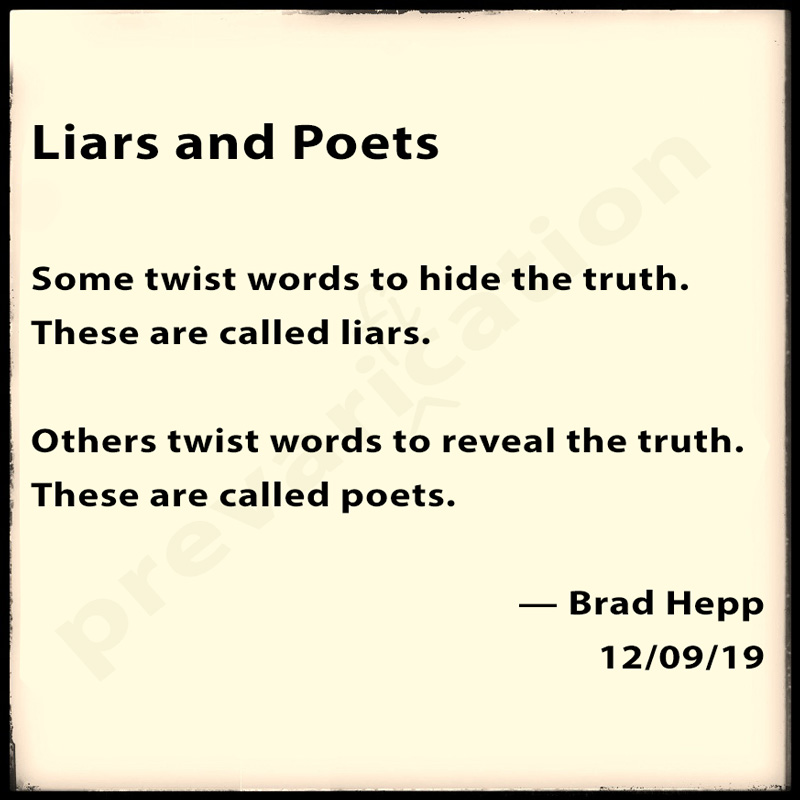
I have been noticing recently that writing poetry is a way to access emotions and thoughts that have been suppressed in some way. So when I say that poets twist words to reveal the truth, I’m referring partly to the truth about what “lurks” in their hearts. Sometimes that truth is good, sometimes not so good! But at least the poet is getting closer to honesty.
At its best, poetry expresses beautiful truths in a way that helps both the poet and reader understand them better. That’s my goal.
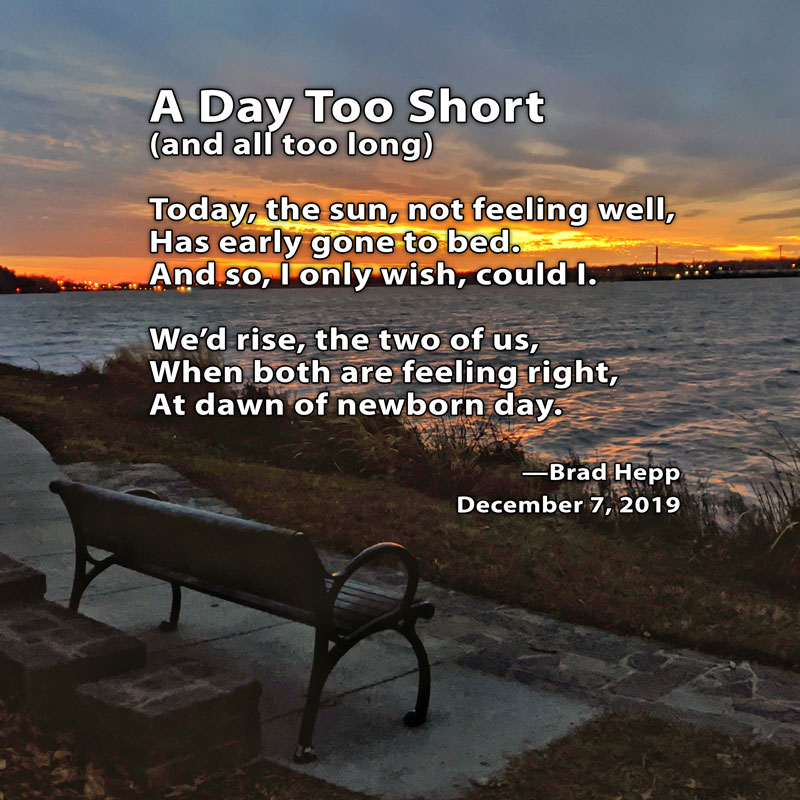
I’ll be hard-pressed to fully explain this one, but let me try by recounting the occasion:
I had been praying for a friend’s father for about a year. He was a brilliant man whose mind and health were failing. My repeated prayer was that God would give him enough clarity of mind and grace to respond in faith to the Savior — if he had not already done so (my friend wasn’t sure). He was on my list of “People I Want to See in Heaven!” God knew all about it.
On Saturday morning, after months in hospice, the father passed away a little before noon. My wife and I heard the sad news shortly after.
A couple of hours later, I was taking my afternoon nap. To help me sleep, I placed a piece of dark, heavy clothing over my face. As I lay there in that artificial darkness, it was as though the sun had gone down. I thought of my friend, and I began to sob. Some of this was fresh grief for my friend. Some was the mounting grief of a lifetime of deaths. I’ve been here before — three years ago, when my own father died.
I thought of how convenient it was that I could press the artificial darkness to my face and express my feelings without alarming my family. How I’d like to stay there, not remove the darkening cloth — now wet — from my face. But this day had many more hours to go.
How does the sun relate to the father? How does that sun both create and respond to the reality of “newborn day”? I have been thinking lately about Romans 8, where creation is depicted as groaning as it awaits freedom from corruption at the “the revealing of the sons of God.” That figures in to my inchoate thoughts. Here’s one of those embarrassing things about poetry: I don’t yet know the meaning of my own words, but firmly believe there IS meaning.
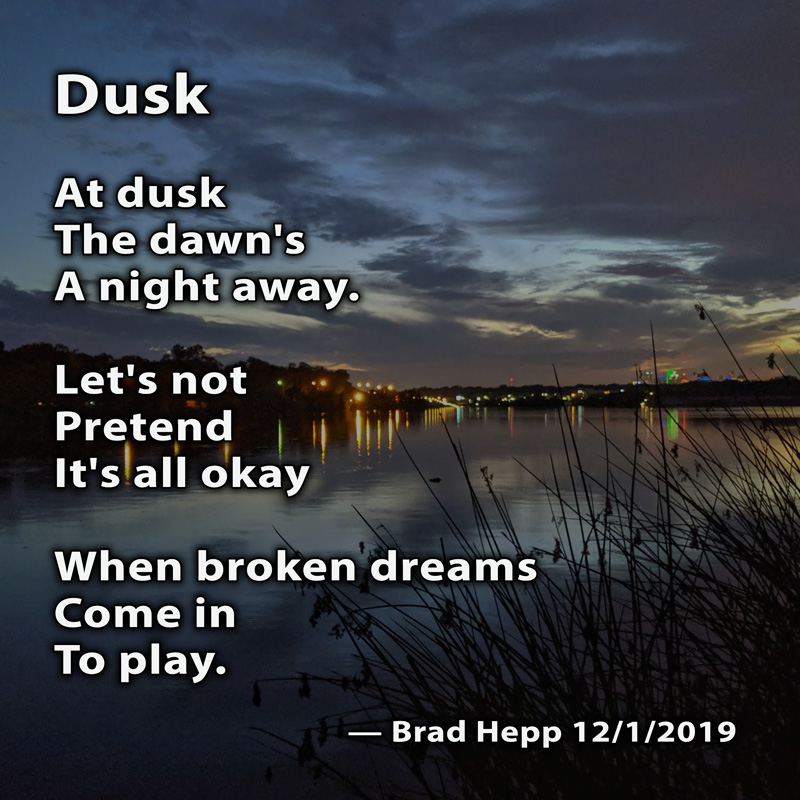
This Advent mindset doesn’t come easy for me, but I’m trying…. When I say “Let’s not pretend,” it’s myself I’m talking to. Being a “glass one-fifth full” guy, I frequently gloss over my own disappointments. And I ignore the suffering of others all too easily. But I’m convinced that God will correct this, that God IS correcting this.
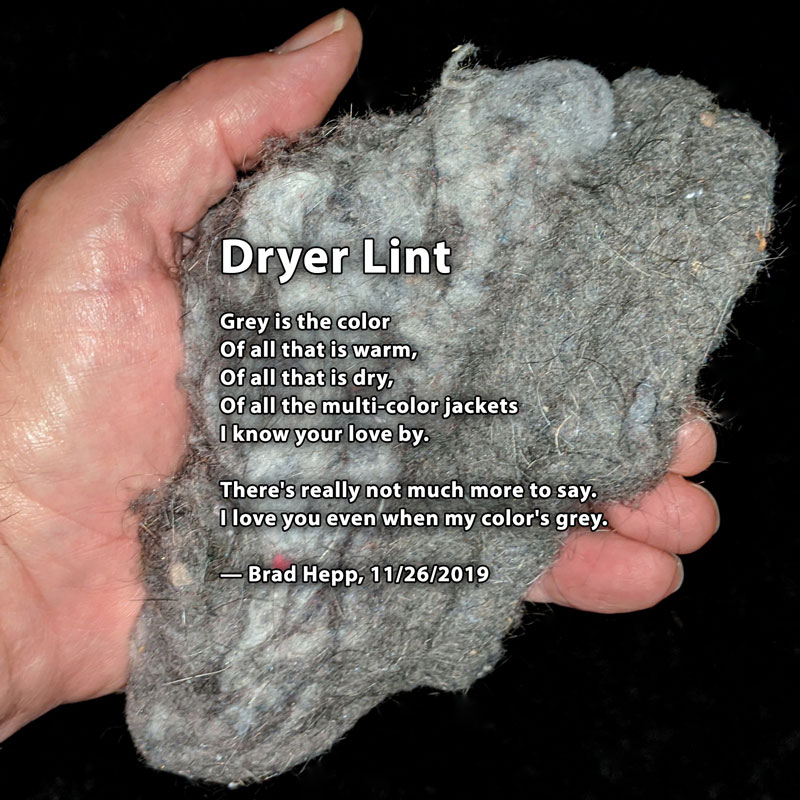
When I posted this on Facebook and Instagram last night, I wrote, “I hope I don’t wake up tomorrow and realize this was nothing more than fluff!” That sounds like I didn’t know what I meant by the words, right?
Increasingly, I find myself able to write poetry and prose in an honest way, where the words express my actual thoughts and feelings, not some bogus sentiment that I concoct to suit a clever turn of phrase. Did you ever suspect that of poetry? Welcome to the skeptics club! How about this one?
Earlier in the day, yesterday, I thought of dryer lint and fluff in a metaphoric sense while writing a cover note to a silly little poem (one which I will not quote for the general public!):
Here’s a bit of doggerel that I cannot share with anyone else. It’s fluff that comes out of the deep appreciation I have for how God has caused our paths to cross.
Cover note for “Heaven is a Haven”
So I thought, “Can I push that metaphor?” What could represent deep appreciation or deep affection and related fluff? A coat of many colors thrown into a clothes dryer might do it!
The part about “when my color’s grey?” That MAY have a deeper referent than I can yet identify and articulate. Sometimes poetry does come out of the subconscience. There’s a fine line between that justification and saying that it’s just a concocted sentiment. Time will tell which this is. Hang on to your skeptic’s hat.
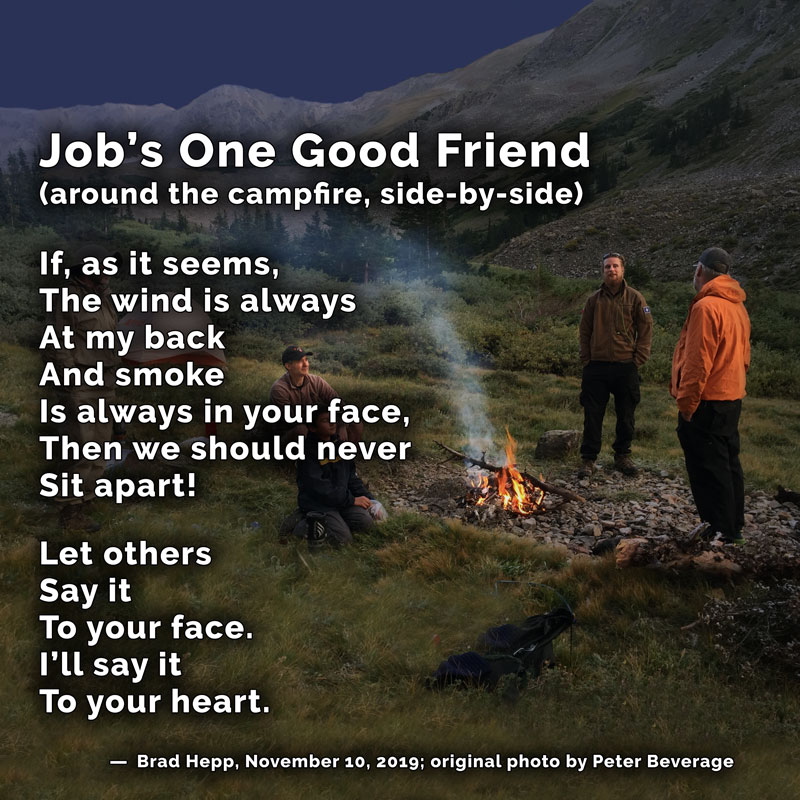
I wrote this after talking briefly with a friend who was struggling. It seemed to me that the friend needed nothing so much as a brother to share his burden — a brother who is willing to suffer alongside, to let the smoke blow in his own face. No lectures. No correction. Silent compassion can speak louder than words. At least that’s what I’m told.
Why “Job’s One Good Friend”? The biblical character Job had friends who sat with him for a while in silence. They had come together “to show him sympathy and comfort him.” But then they opened their mouths, and it wasn’t helpful. It seems that the one who came closest to being a true friend kept his mouth closed the longest.
And why a campfire? If you’ve ever sat around a campfire in the mountains, you know that as the wind direction shifts, the smoke sometimes blows in your face. Some guys feel that they are the target, no matter where they sit! I picture Job and his friends sitting around such a campfire, perhaps one that burned down to embers and then to ashes. “And he took a piece of broken pottery with which to scrape himself while he sat in the ashes.”
This poem is about photography AND learning from older people. See the commentary below.
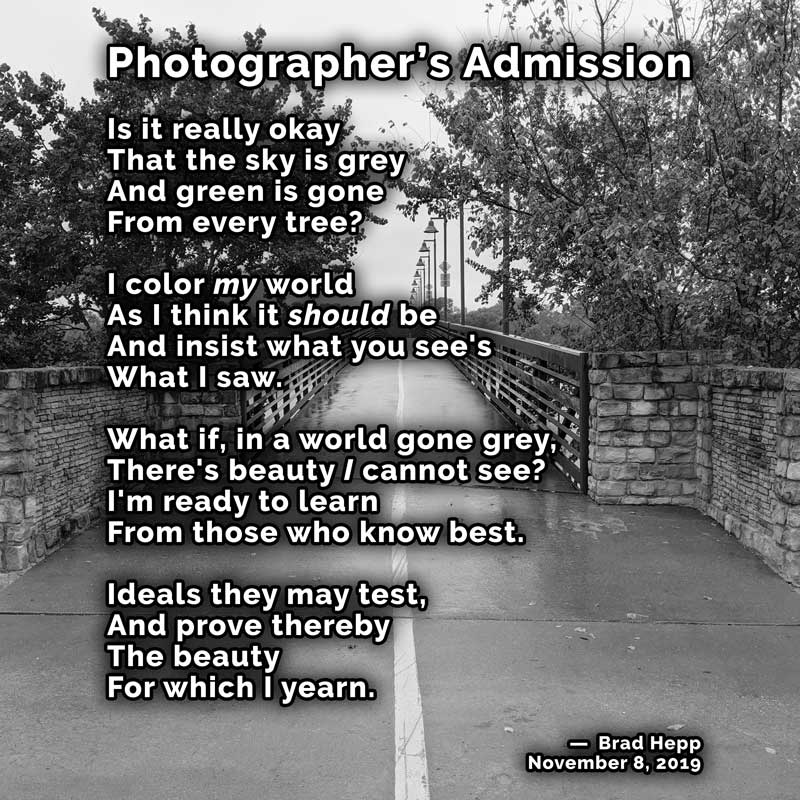
The thought in this poem crystalized as I was looking at a friend’s Instagram photos. The friend is not a photographer, just someone who understands and appreciates the great outdoors. I was looking at one of his early-morning mountain scenes. The sky was literally grey and the trees had no green in them. The photographer in me always aches to edit such photos so that they match my ideal of beauty, and I often excuse my own editing as an attempt to make sure the photo depicts the scene as our magnificent human eyes would have seen it. This all assumes or suggests the conceit that I am the expert, that my vision is the standard.
But my photography and poetry are expressions of something far more important: the desire to fully appreciate and reflect the beauty inherent in a world created by God. In this pursuit, I revel in the wisdom that is both longed for — loudly insisted on — by youth and quietly attained in old age.
Perhaps what I wrote on Facebook will clarify:
Here’s a book that needs to be written: “removing THE BARNICLES OF CHRONIA.” I say this partly in jest, partly “en serio.” As I age, and come to important new realizations about life, I think of my older friends. Many have been down this road already, but were not inclined to chronicle the journey. It seems that we could serve others by offering an honest, thankful, hopeful account. Thoughts?
[Edit, 11/8/2019: Last night, I discussed the project above with fellow creative writers. It’s still on my mind. The poem and photograph below ponders the subject by different means.]
By the way, I know the last stanza is difficult. I’m using “prove” in the sense of “testing so as to find what works.” I think that a full appreciation of beauty is attainable. I fancy that is one of the things that God is even now perfecting in His children. But we all have false or incomplete ideas about beauty in its various manifestations (visual, physical, emotional, intellectual, theological, etc.). For instance, I highly suspect that I still have a false idea about the relationship of beauty and suffering: “Suffering is bad, not suffering is good!” How can suffering have anything to do with beauty?
The answer to the question I just posed is one which I suspect people older than I — and some younger than I — understand far better than I currently understand it. The answer surely goes something like this: through suffering, we are prepared for the beauty that is coming. The answer is somewhere in Romans 8. Perhaps in this passage:
16 The Spirit himself testifies with our spirit that we are God’s children. 17 Now if we are children, then we are heirs—heirs of God and co-heirs with Christ, if indeed we share in his sufferings in order that we may also share in his glory. 18 I consider that our present sufferings are not worth comparing with the glory that will be revealed in us. 19 For the creation waits in eager expectation for the children of God to be revealed.
Romans 8:16-19 (ESV)
It was dark in the living room. My wife and boys had already gone to bed, and I was left alone in the papa chair. By faint light coming from the kitchen, I could see Princess on a blanket we had set for her on the floor. She sat there, as peaceful and dignified as ever, probably purring. Two days before, she had stopped eating altogether, even when Joshua stroked her bony back and tried feeding her from his hand. The tumor in her stomach had won, and now she could barely walk, let alone jump or climb onto the couch.
In the morning, Joshua and Susan would take her to the vet. They’d ask the vet for some locks of her beautiful hair to remember her by. It seemed more appropriate than ashes.
Sitting there in the dark, I thought of how Princess’ well-being had been my responsibility for most of her seventeen years. Under my protection, neither hawks in the trees above nor the bitter cold of winter nights had ever touched her beautiful form. But now…. Now, tears began to stream. “I’m sorry, Princess. There’s nothing I can do for you this time.”
Up to this point in my life, I had never really understood corporate guilt. “Yes,” I could admit — only because good theology demands it — “I somehow share in the sin of Adam and Eve. But slavery and other atrocities? If neither I nor any of my relatives ever committed this or that sin, how can I — why should I — feel any guilt in the matter!”
That’s not what I was thinking about in the darkness of the night.
Looking at Princess across the room, I was sad. That much was clear, especially in the darkness. But then a little window opened. Through my tears, new light came streaming. It was sorrow, an emotion I barely recognize. “Princess,” I wept, “Not only am I unable to help you now, but in a very real — painfully real — sense, I am responsible for all that brought us to this dark night. I am truly sorry!” In that moment, for the first time ever, I was Adam. Once upon a time, God set me over His creation as its protector and provider. But I failed. And now, my Princess, like everything else under my charge, was dying.
A small window opened for me that night. Wisdom whispers, “Don’t let it close!”
Perhaps, in the light of that account, this poem I wrote the following day will make sense:
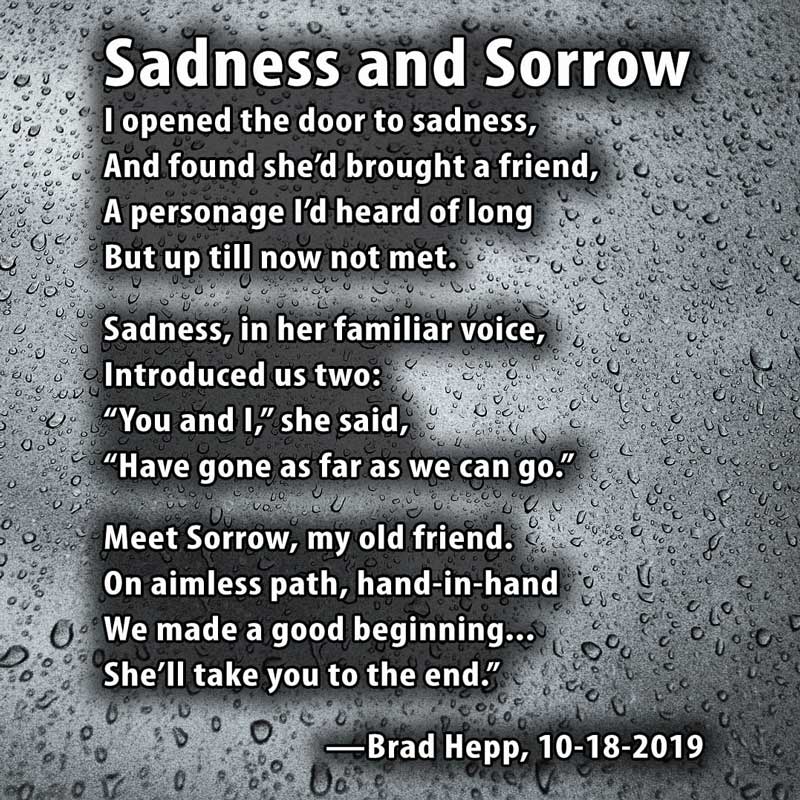
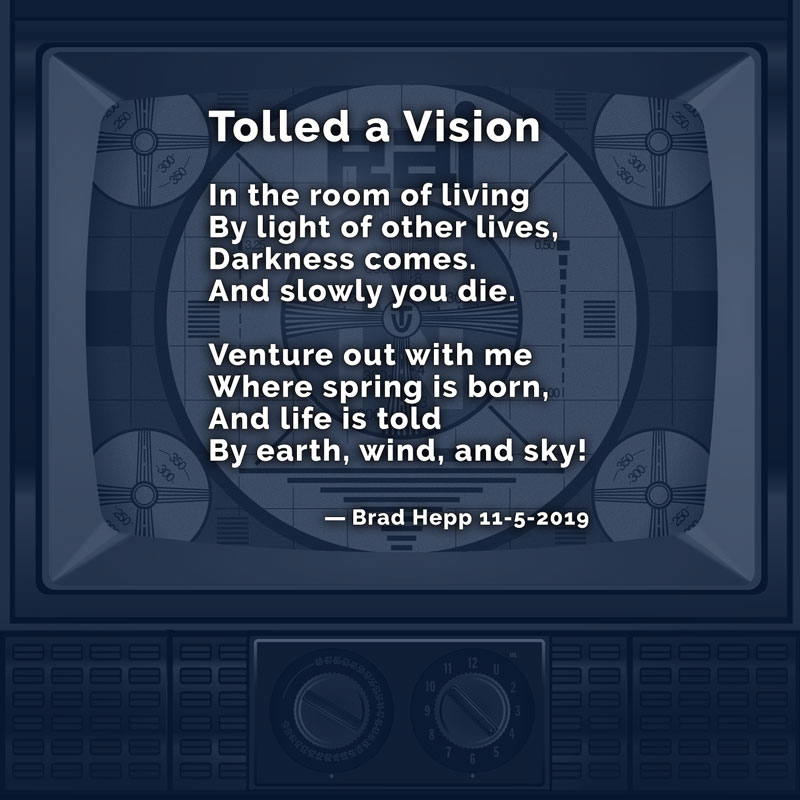
My pastor had this response: “I like it. Slowly we die as we are absorbed by the fictional lives of others dancing before our eyes when real life is just a power button and a glance away…”
My riposte: “… and a good pair of sneakers if you’re so disposed!”
Despite my riposte, this poem is more about the first stanza than the second. Not everyone can don a pair of sneakers and join me on long hikes. But everyone can seek to live as directly as possible, fully appreciating their own God-given life and embracing God’s offer of rebirth, restoration, and eternal life. For most people, this appreciation and embracing requires a little — or a lot — of contemplation, meditation. Noise and distraction are the enemy. Compare my poem “Alone at the Lake.”
About the title: I’m not completely happy with the title. You can probably tell that I started with “Television.” From there, I started pushing on “Tele,” “Tell,” and finally landed on “Tolled.” It may be too far out there. But consider that “toll” is associated with death (“For Whom the Bell Tolls”). It also sounds like “told.” Even as the flitting and vapid* “lives” of fictional characters displayed on a television have “tolled” our dying, and have “told” us the bad news, nature itself has “told” us about better news, the hope of resurrection. A big stretch, I know! This is my blurry vision, and now I have told you.
*This needs work. I do think there is something of “the medium is the message” in this. In television, we have lives that are extinguished with the press of a button.
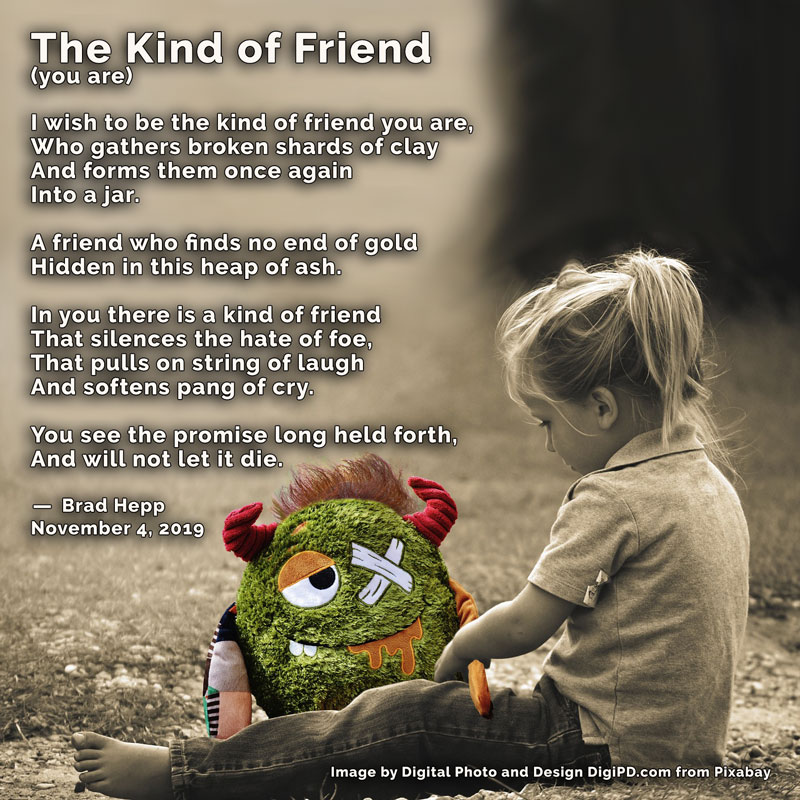
This morning, I was beginning to read a poem by Gerard Manley Hopkins. He’s a poet I know little about, but am confident he will be worth getting to know. His poem, “The Windhover” begins
I caught this morning morning’s minion, kingdom of daylight’s dauphin…
The effort to unravel “morning morning’s minion,” and the delight I felt as a result, suggested my own “morning catch,” which morphed quickly into “meaning’s catch:”
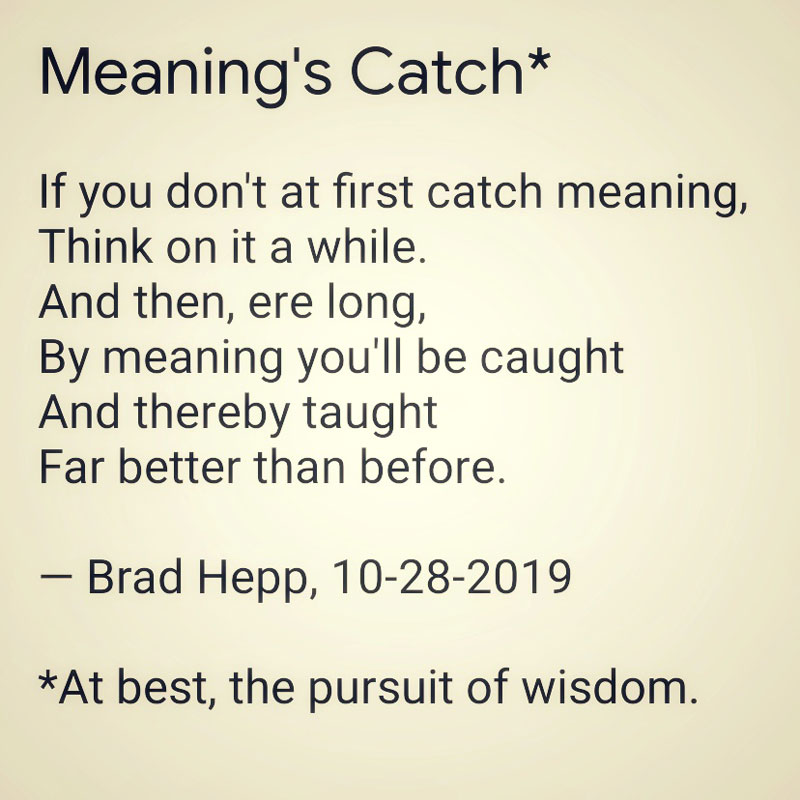
Here is how I commented on my own poem on Facebook:
The creative writers I recently began meeting with spent much of our first few sessions grappling with the PURPOSE of our writing. In the case of poetry, one question is “Why use metaphors when plain words could express the thought?” One of the best answers for me is that truth has more impact on a person when he or she puts effort into understanding it (this applies to the author and reader alike). My father and I spent years puzzling through Robert Browning’s “Rabbi Ben Ezra” (Grow old along with me…). I’m convinced that Browning’s insight has had far more positive effect in my thinking BECAUSE of that puzzling than it would have had Browning “just said what he meant!”
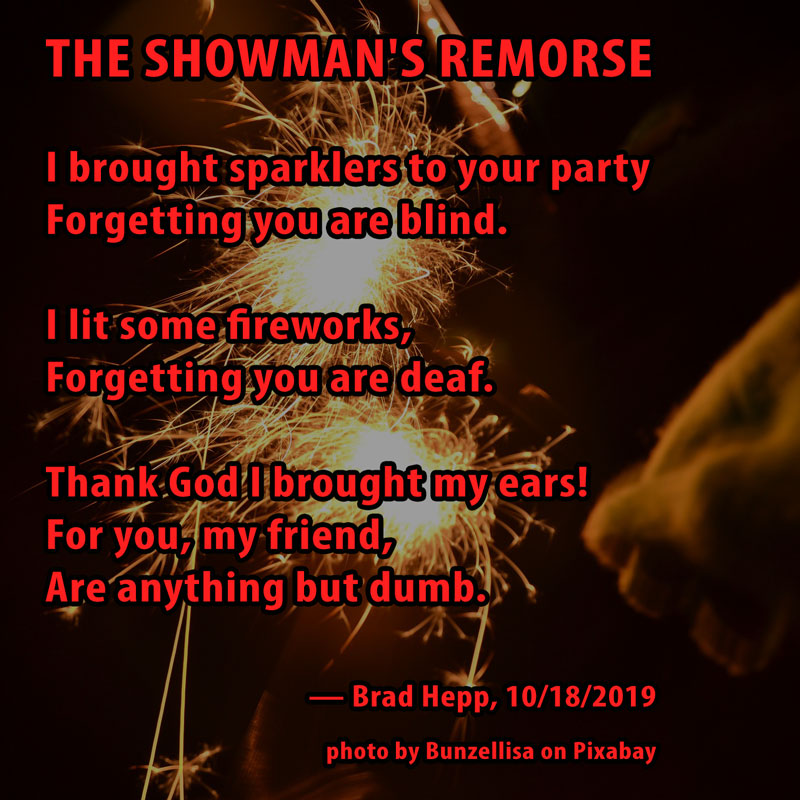
IT’S ALWAYS DANGEROUS to admit your faults in public. But here goes…. I’m occasionally an idolater. Not just any idolater, but one whose idol is himself. HOWEVER, God is merciful. He knows that I want to leave idolatry behind, and — with the patience of one who knows the end from the beginning — He’s working on me. I wrote this several weeks ago, and have not had the courage to post it until now, except to some other creatives who intimately understand the struggle.
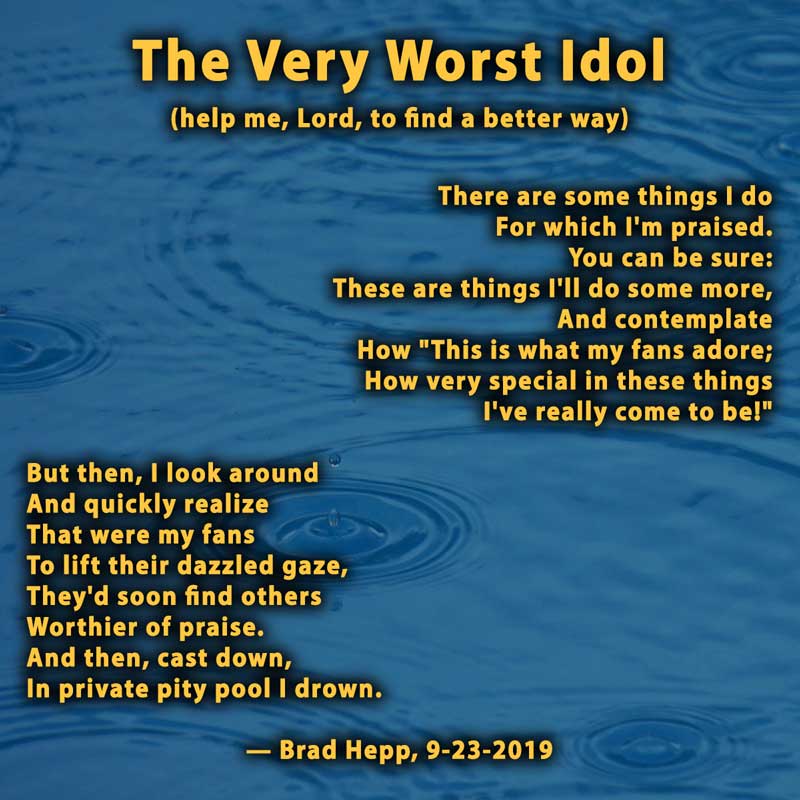
Yesterday, I attended a birthday party for Youssef Sleiman. All who attended were given the opportunity to read something they had written, or to extemporize about how God has uniquely crafted this man to bring Himself glory. It was something like a memorial service, where the eulogies went on for over two hours. But in this case, the eulogee — the dearly not departed — was sitting there right beside us laughing and occasionally weeping.
I wrote a poem for the occasion, and was happy to see that much of what I wrote matched the reflections of people who have known Youssef far longer than I:
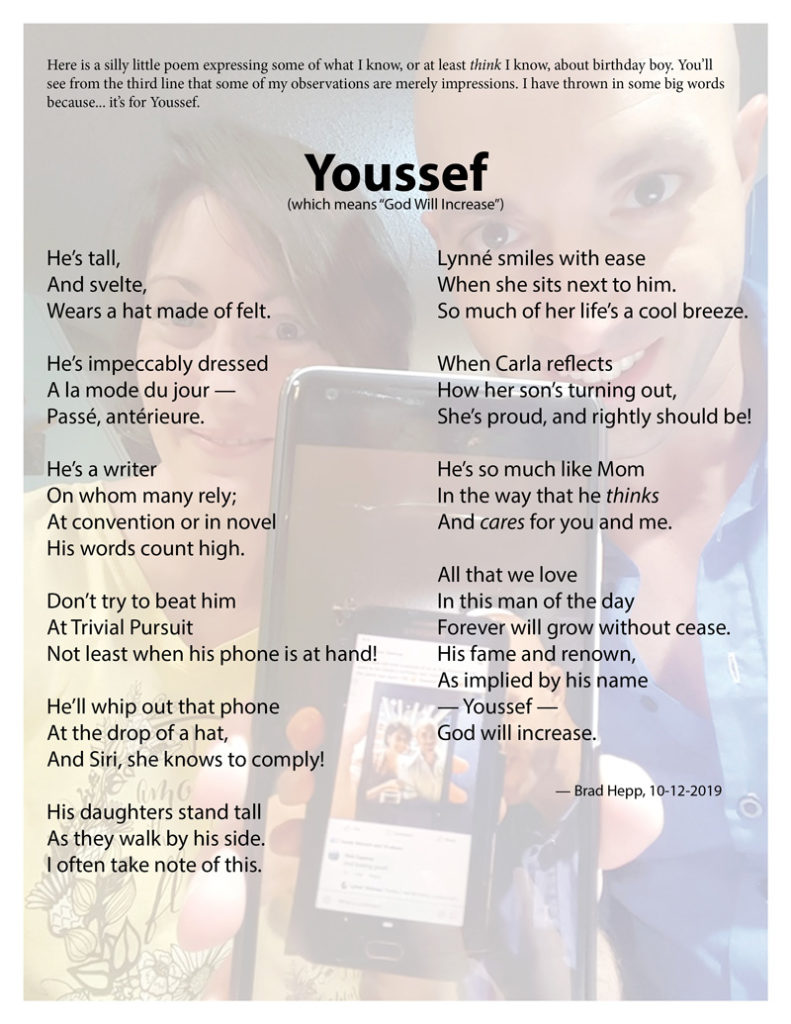
Background image stolen from Lynné Sleiman’s Facebook feed, where it was titled “Meta.”
